English puzzle
英文常用词汇

英文常用词汇一、动物〔animals〕animal ['æniməl]cat猫[kæt]dog狗[dɔɡ, dɔ:ɡ]pig猪[piɡ]duck鸭[dʌk]rabbit兔['ræbit]horse马[hɔ:s]elephant大象['elifənt]ant蚂蚁[ænt]fish鱼[fiʃ]bird鸟[bə:d]eagle鹰['i:ɡl]beaver海狸['bi:və]snake蛇[sneik]mouse老鼠[maus, mauz]squirrel松鼠['skwə:rəl, 'skwi-,'skwʌ-]kangaroo袋鼠[,kænɡə'ru:]monkey猴['mʌŋki]panda熊猫['pændə]bear熊[bεə]lion狮子['laiən]tiger老虎['taiɡə]fox狐狸[fɔks]zebra斑马['zi:brə]deer鹿[diə]giraffe长颈鹿[dʒi'rɑ:f]goose鹅[ɡu:s]hen母鸡[hen]turkey火鸡['tə:ki]lamb小羊[læm]sheep绵羊[ʃip]goat山羊[ɡəut]cow奶牛[kau]donkey驴['dɔŋki]squid鱿鱼[skwid]lobster龙虾['lɔbstə]shark鲨鱼[ʃɑ:k]seal海豹[si:l]sperm whale抹香鲸[spə:m-hweil]killer whale虎鲸['kilə-hweil]二、人物〔people〕['pi:pl] friend朋友[frend]boy男孩[bɔi]girl女孩[ɡə:l]mother母亲['mʌðə]father父亲['fɑ:ðə]sister姐妹['sistə]brother兄弟['brʌðə]uncle叔叔;舅舅['ʌŋkl]man男人[mæn]woman女人['wumən]Miss小姐[mis] Mr.先生lady女士;小姐['leidi]mom妈妈[mɔm] dada爸爸[dæd, 'dɑ:dɑ:]parents父母parent ['pεərənt]grandparents祖父母['ɡrænd,pεərənt]grandma/grandmother〔外〕祖母['ɡrænd,mʌðə]aunt姑姑[ɑ:nt, ænt]cousin堂〔表〕兄弟;堂〔表〕姐妹['kʌzən]son儿子[sʌn]daughter女儿['dɔ:tə]baby婴儿['beibi]kid小孩[kid]classmate同学['klɑ:smeit]queen女王[kwi:n]visitor参观者['vizitə]neighbour邻居['neibə]principal校长['prinsəpəl]university student大学生[,ju:ni'və:səti-'stju:dənt]pen pal笔友[pen-pæl]tourist旅行者['tuərist]people人物['pi:pl]robot机器人['rəubɔt, -bət, 'rɔbət]grandpa/grandfather〔外〕祖父['ɡrændpɑ:] /['ɡrænd,fɑ:ðə]三、职业〔jobs〕[dʒɔbs] teacher教师student学生['stju:dənt, 'stu:-] doctor医生[dɔktə]nurse护士[nə:s]driver司机[nə:s]farmer农民['fɑ:mə]singer歌唱家['siŋə]writer作家['raitə]actor男演员['æktə]actress女演员['æktris]artist画家['ɑ:tist]TV reporter电视台记者[ri'pɔ:tə]engineer工程师[,endʒi'niə]accountant会计[ə'kauntənt]policeman(男)警察[pə'li:smən]ssalesperson销售员['seilz,pə:sən]cleaner清洁工['kli:nə]baseball player棒球运发动['beisbɔ:l-'pleiə]assistant售货员[ə'sistənt]police警察[pə'li:s]四、学习用品(school[sku:l] things)Pen钢笔[pen]Pencil铅笔['pensəl]pencil-case铅笔盒['pensəl-keis]ruler尺子['ru:lə]book书[buk] bag包[bæɡ]comic book漫画书['kɔmik-buk]post card明信片[pəust-kɑ:d]newspaper报纸['nju:s,peipə,'nju:z-]schoolbag书包['sku:lbæɡ]eraser橡皮[i'reizə]crayon蜡笔['kreiən]sharpener卷笔刀story-book故事书['stɔ:ri-buk]notebook笔记本['nəutbuk]Chinese book语文书English book英语书math book数学书[mæθ-buk]magazine杂志[,mæɡə'zi:n]dictionary词典['dikʃənəri]五、人体〔body〕['bɔdi] foot脚[fut]head头[hed]face脸[feis]hair头发[hεə] nose鼻子[nəuz]mouth嘴[mauθ]eye眼睛[ai]ear耳朵[iə]arm手臂[ɑ:m]hand手[hænd]finger手指['fiŋɡə]leg腿[leɡ]tail尾巴[teil]六、颜色〔colours〕red红[red]blue蓝[blu:]yellow黄['jeləu] green绿[ɡri:n]white白[hwait]black黑[blæk]pink粉红[piŋk]purple紫['pə:pl]orange橙['ɔrindʒ, 'ɔ:-]brown棕[braun]七、食品、饮料〔food & drink〕rice米饭[rais]bread面包[bred]beef牛肉[bi:f]milk牛奶[milk]water水['wɔ:tə, 'wɔ-]egg蛋[eɡ]fish鱼[fiʃ]tofu豆腐['təufu:]cake蛋糕[keik]hot dog热狗[hɔt-[dɔɡ] hamburger汉堡包['hæmbə:ɡə] French fries炸薯条[fraids]cookie曲奇['kuki]biscuit饼干['biskit]jam果酱[dʒæm]noodles面条['nu:dl]meat肉[mi:t]chicken鸡肉['tʃikin]pork猪肉[pɔ:k]mutton羊肉['mʌtən]vegetable蔬菜['vedʒitəbl]salad沙拉['sæləd]soup汤[su:p]ice冰[ais]ice-cream冰淇淋['aiskri:m]Coke可乐juice果汁[dʒu:s]tea茶[ti:]coffee咖啡['kɔfi]breakfast早餐['brekfəst]lunch午餐[lʌntʃ]dinner/supper晚餐['dinə] /['sʌpə]meal一餐[mi:l]八、水果、蔬菜(fruit/ vegetables)[fru:t]['vedʒitəbl]apple苹果['æpl]banana香蕉[bə'nɑ:nə, -'næ-] pear梨[pεə] orange橙['ɔrindʒ, 'ɔ:-]watermelon西瓜['wɔ:tə-'melən]grape葡萄[ɡreip]eggplant茄子['eɡplɑ:nt,-plænt]green beans青豆[ɡri:n-bi:n]tomato西红柿[tə'mɑ:təu]potato土豆[pə'teitəu]peach桃[pi:tʃ]strawberry草莓['strɔ:bəri]cucumber黄瓜['kju:kʌmbə]onion洋葱['ʌnjən]carrot胡萝卜['kærət]cabbage卷心菜['kæbidʒ]九、衣服〔clothes〕[kləuðs] jacket夹克衫['dʒækit]shirt衬衫[ʃə:t]T-shirt丅恤衫skirt短裙子[skə:t]dress连衣裙[dres]jeans牛仔裤[dʒi:n, dʒein] pants长裤[pænts]socks袜子[sɔk]s shoes鞋子[ʃu:]ssweater毛衣['swetə]coat上衣[kəut]raincoat雨衣['reinkəut]shorts短裤[ʃɔ:t]ssneakers网球鞋['sni:kə] sslippers拖鞋['slipə]ssandals凉鞋['sædəl]sboots靴子[bu:ts]hat(有沿的)帽子[hæt]cap便帽[kæp]sunglasses太阳镜['sʌn,ɡlɑ:siz,-,ɡlæ-]tie领带[tai]scarf围巾[skɑ:f]gloves手套[ɡlʌv]strousers裤子['trauzəz]cloth布[klɔθ, klɔ:θ]十、交通工具(vehicles)['vi:ikl] bike自行车[baik]bus公共汽车[bʌs]train火车[trein]boat小船[bəut]ship轮船[ʃip]yacht快艇[jɔt]car小汽车[kɑ:]taxi出租车['tæksi]jeep吉普车[dʒi:p]van小货车;面包车[væn]plane/airplane飞机[plein] /['εəplein]subway/underground地铁['sʌbwei] /['ʌndəɡraund]motor cycle摩托车['məutə-'saikl]十一、杂物〔other things〕['ʌðə][θiŋ]swindow窗户['windəu]door门[dɔ:]desk课桌[desk]chair椅子[tʃεə]bed床[bed]computer电脑[kəm'pju:tə] board写字板[bɔ:d]fan风扇[fæn]light灯['lait] teacher's desk讲台['ti:tʃə][desk]picture图画;照片['piktʃə]wall墙壁[wɔ:l]floor地板[flɔ:]curtain窗帘['kə:tən]trash bin垃圾箱[træʃ][bin]closet壁橱['klɔzit]mirror镜子['mirə]end table床头柜[end-'teibl]football/soccer足球['fut,bɔ:l]['sɔkə]present礼物['prezənt, pri'zent]walkman随身听[wɔ:k-mæn]lamp台灯[læmp]phone [fəun]sofa沙发['səufə]shelf书架[ʃelf]fridge冰箱[fridʒ]table桌子['teibl]TV电视air-conditioner空调[εə] [kən'diʃənə]key钥匙ki:]lock锁[lɔk] photo照片['fəutəu] chart图表[tʃɑ:t] plate盘子[pleit] knife刀[naif]fork叉[fɔ:k] spoon勺子[spu:n] chopsticks筷子pot锅[pɔt]gift礼物[ɡift]toy玩具[tɔi]doll洋娃娃[dɔl]ball球[bɔ:l]balloon气球[bə'lu:n]kite风筝[kait]jigsaw puzzle拼图游戏['dʒiɡsɔ:] ['pʌzl]box盒子[bɔks]umbrella伞[ʌm'brelə]zipper拉链['zipə]violin小提琴[,vaiə'lin]yo-yo溜溜球nest鸟窝[nest]hole洞[həul]tube管子[tju:b, tu:b]toothbrush牙刷['tu:θbrʌʃ]menu菜单['menju:, mə'nju:]e-card电子卡片[kɑ:d]e-mail电子邮件[meil]traffic light交通灯['træfik]['lait]money钱['mʌni]medicine药['medisin]十二、地点〔locations〕[ləu'kei ʃən] shome家[həum]room房间[ru:m, rum] bedroom卧室['bedru(:)m] bathroom卫生间['bɑ:θrum] living room起居室['liviŋ][ru:m, rum]kitchen厨房['kitʃin] classroom教室['klɑ:srum] school学校[sku:l]park公园[pɑ:k]library图书馆['laibrəri]post office邮局[pəust]['ɔfis] police office警察局[pə'li:s] ['ɔfis]hospital医院['hɔspitəl] cinema电影院['sinəmə] bookstore书店['bukstɔ:] farm农场[fɑ:m]zoo动物园[zu:]garden花园['ɡɑ:dn]study书房['stʌdi]playground操场['pleiɡraund]canteen食堂[kæn'ti:n]teacher's office教师办公室['ti:tʃə]s['ɔfis]library图书馆['laibrəri]gym体育馆[dʒim]washroom卫生间['wɔʃrum]art room绘画教室[ɑ:t] [ru:m,rum]computer room电脑教室[kəm'pju:tə] [ru:m]music room音乐教室['mju:zik][ru:m, rum]TV room电视机房[ru:m]flat公寓[flæt]company公司['kɔmpəni]factory工厂['fæktəri]fruit stand水果摊[fru:t] [stænd]pet shop宠物商店[pet] [ʃɔp]nature park自然公园['neitʃə][pɑ:k]theme park主题公园[θi:m] [pɑ:k]science museum科学博物馆['saiəns][mju:'ziəm]the Great Wall长城[ɡreit] [wɔ:l]supermarket超市['sju:pə,mɑ:kit]bank银行[bæŋk]country国家['kʌntri]village乡村['vilidʒ]city城市['siti]hometown家乡['həum'taun]bus stop公交车站[bʌs][stɔp]十三、课程〔classes〕[klɑ:s, klæs]sports体育运动[spɔ:ts] science科学['saiəns]Moral Education思想品德课['mɔrəl-,edju:'keiʃən]Social Studies社会课['səuʃəl]Chinese语文math数学[mæθ]PE体育课English英语课十四、国家、城市〔countries/cities〕['kʌntriz] /['siti]China/PRC中国People's Republic of China〕['pi:pls][ri'pʌblik][ɔv]America/USA美国UK联合王国〔United Kingdom〕England英国Canada/CAN加拿大Australia澳大利亚New York纽约London伦敦Sydney悉尼Moscow莫斯科Cairo开罗十五、气象〔weather〕['weðə] cold寒冷的[kəuld]warm温暖的[wɔ:m]cool凉爽的[ku:l]snowy下雪的['snəui]sunny晴朗的['sʌni]hot炎热的[hɔt]rainy下雨的['reini]windy有风的['windi]cloudy多云的['klaudi]weather report天气预报['weðə][ri'pɔ:t]十六、景物〔nature〕['neitʃə] river河流['rivə]lake湖泊[leik]stream河;溪[stri:m]forest森林['fɔrist]path小道[pɑ:θ, pæθ]road公路[rəud] house房子[haus, hauz]bridge桥[bridʒ]building建筑物['bildiŋ]rain雨[rein]cloud云[klaud]sun太阳[sʌn]mountain山['mauntin]sky天空[skai]rainbow彩虹['reinbəu]wind风[wind]air空气[εə]moon月亮[mu:n]十七、植物〔plants〕[plɑ:nt, plænt] sflower花['flauə]grass草[ɡrɑ:s, ɡræs]tree树[tri:]seed种子[si:d]sprout苗[spraut]plant植物[plɑ:nt, plænt]rose玫瑰leaf叶子[li:f]十八、星期〔week〕[wi:k] Monday星期一Tuesday星期二Wednesday星期三Thursday星期四Friday星期五Saturday星期六Sunday星期天weekend周末[,wi:k'end,'wi:kend]十九、月份〔months〕[mʌnθ]z Jan. (January)一月Feb.〔February〕二月Mar.(March)三月[mɑ:tʃ]April四月May五月[mei]June六月July七月Aug.(August)八月[ɔ:'ɡʌst]Sept.(September)九月Oct.(October)十月Nov.(November)十一月Dec.(December)十二月二十、季节〔seasons〕['si:zən]s spring春[spriŋ]summer夏['sʌmə]fall/autumn秋[fɔ:l]/['ɔ:təm]winter冬['wintə]二十一、方位〔directions〕[di'rek ʃən]ssouth南[sauθ, sauð]north北[nɔ:θ]east东[i:st]west西[west]left 左边[left]right右边[rait]up上[ʌp]down下[daun]二十二、患病〔illness〕['ilnis] have a fever发烧['fi:və]hurt疼痛[hə:t]have a cold感冒[kəuld]have a toothache牙疼have a headache头疼['hedeik]have a sore throat喉咙疼[sɔ:][θrəut]二十三、数词〔numbers〕['nʌmbəz]one一[wʌn]two二[tu:]three三[θri:]four四[fɔ:]five五[faiv]six六[siks]seven七['sevən]eight八[eit]nine九[nain]ten十[ten]eleven十一[i'levən]twelve十二[twelv]thirteen十三['θə:'ti:n] fourteen十四['fɔ:'ti:n]fifteen十五['fifti:n]sixteen十六['siks'ti:n]seventeen十七[,sevən'ti:n]eighteen十八['ei'ti:n]nineteen十九[,nain'ti:n]twenty二十['twenti]thirty三十['θə:ti]forty四十['fɔ:ti]fifty五十['fifti]sixty六十['siksti]seventy七十['sevənti]eighty八十['eiti]ninety九十['nainti]forty-two四十二['fɔ:ti- tu:]hundred百['hʌndrəd]one/a hundred and thirty-six一百三十六first第一[fə:st]second第二['sekənd]third第三[θə:d]fourth第四[fɔ:θ]fifth第五[fifθ]eighth第八[eitθ, eiθ]ninth第九[nainθ]twelfth第十二[twelfθ]twentieth第二十['twentiiθ]thirtieth第三十fortieth第四十fiftieth第五十['fiftiiθ]sixtieth第六十['sikstiθ]seventieth第七十eightieth第八十ninetieth第九十fifty-sixth第五十六二十四、形容词(adj.) big大的[biɡ]small小的[smɔ:l]long长的[lɔŋ, lɔ:ŋ]tall高的[tɔ:l]short短的;矮的[ʃɔ:t] young年轻的[jʌŋ]old旧的;老的[əuld]strong健壮的[strɔŋ, strɔ:ŋ]thin瘦的[θin]active积极活跃的['æktiv]quiet安静的['kwaiət]nice好看的[nais]kind和蔼亲切的[kaind]strict严格的[strikt]smart聪明的[smɑ:t]funny滑稽可笑的['fʌni]tasty好吃的['teisti]sweet甜的[swi:t]salty咸的['sɔ:lti]sour酸的['sauə]fresh新鲜的[freʃ]favourite最喜爱的['feivərit]clean干净的[kli:n]tired疲劳的['taiə]dexcited兴奋的[ik'saitid]angry生气的['æŋɡri]happy高兴的['hæpi]bored无聊的sad忧愁的[sæd]taller更高的[tɔ:l] əshorter更矮的[ʃɔ:t] əstronger更强壮的[strɔŋ, strɔ:ŋə]older年龄更大的['əuldə] younger更年轻的['jʌŋə, 'jʌŋɡə] bigger更大的[biɡə]heavier更重的['lɔŋɡə, 'lɔ:ŋ-] longer更长的['lɔŋɡə, 'lɔ:ŋ-]thinner更瘦的smaller更小的[smɔ:lə]good好的[ɡud]fine好的[fain]great很好的[ɡreit]heavy 重的['hevi]new新的[nju:, nu:]fat胖的[fæt]happy快乐的['hæpi]right对的[rait]hungry饥饿的['hʌŋɡri]cute逗人喜爱的[kju:t]little小的['litl]lovely可爱的['lʌvli]beautiful漂亮的['bju:tiful]colourful色彩鲜艳的['kʌləful]pretty漂亮的['priti]cheap廉价的[tʃi:p]expensive昂贵的[ik'spensiv]juicy多汁的['dʒu:si]tender嫩的['tendə]healthy健康的['helθi]ill有病的[il]helpful有帮助的['helpful]high高的[hai]easy简单的['i:zi]proud骄傲的[praud]sick有病的[sik]better更好的[betə]higher更高的[haiə]二十五、介词〔prep.〕in在……里[in]on在……上;在……时候[ɔn, ɔ:n, ən, n]under在……下面['ʌndə]near在……的旁边[niə]behind在……后边[bi'haind]next to与……相邻[nekst]over在……上面['əuvə]in front of在……前面[frʌnt]二十六、代词〔pron.〕I我we我们[wi:弱wi]you你;你们[ju:, 弱ju, jə] he他[hi:, 弱hi, i:, i]she她[ʃi:]it它[it]they他〔她,它〕们[ðei, 弱ðe]my我的our 我们的['auə, ɑ:]your你的;你们的[jɔ:, jəu, 弱jə]his他的[hiz, 弱iz]her她的[hə:, 弱ə:, hə, ə]二十七、动词〔v.〕play〔.ed〕玩;踢[plei] swim(swam)游泳[swim] skate滑冰[skeit]fly(flew)飞[flai]jump跳[dʒʌmp]walk走[wɔ:k]run(run)跑[rʌn]climb爬[klaim]fight(fought)打架[fait]swing(swung)荡[swiŋ]eat(ate)吃[i:t]sleep(slept)睡觉[sli:p]like像,喜欢[laik]have(had)有;吃[hæv, 弱həv,əv, v]turn转弯[tə:n]buy(bought)买[bai]take(took)买;带[teik]live居住[liv]teach〔taught〕教[ti:tʃ]go(went)去[ɡəu]study(studied)学习['stʌdi]learn学习[lə:n]sing(sang)唱歌[siŋ]dance跳舞[dɑ:ns, dæns]row划[rəu]do(did)做[强du:, 弱du, də, d,du:]do homework做作业['həumw ə:k]do housework做家务['hausw ə:k]watch TV看电视[wɔtʃ, wɔ:tʃ] read(read) books读书[ri:d] [buks]cook the meals做饭[kuk] [mi:ls] water the flowers浇花['wɔ:tə, 'wɔ-]['flauəz]sweep(swept) the floor扫地[swi:p] [flɔ:]clean the bedroom打扫卧室[kli:n] ['bedru(:)m]make(made) the bed铺床[meik] [bed]set(set) the table摆饭桌[set] ['teibl]wash the clothes洗衣服[wɔʃ, w ɔ:ʃ] [kləuðz]do the dishes洗碗碟use a computer使用电脑[ju:z] [kəm'pju:tə]do morning exercises晨练;做广播操['mɔ:niŋ]['eksəsaiz]eat breakfast吃早饭[i:t]['brekfəst]eat dinner吃晚饭[i:t] ['dinə]go to school上学[sku:l]have English class上英语课[kl ɑ:s, klæs]play sports进行体育运动[plei] [spɔ:ts]get〔got〕up起床ɡet]climb mountains爬山[klaim] ['mauntins]go shopping买东西[ɡəu]['ʃɔpiŋ]play the piano弹钢琴[plei][pi'ænəu, pi'ɑ:-]visit grandparents看望〔外〕祖父母['vizit] ['ɡrænd,pεərənts]go hiking去远足fly kites放风筝[flai][kaits]make a snowman堆雪人[meik]['snəumæn]plant trees种树[plɑ:nt, plænt][tri:s]draw(drew) pictures画画[drɔ:]['piktʃəz]cook dinner做饭[kuk]['dinə]read a book看书[ri:d] [buk]answer the phone接['ɑ:nsə,'æn-] [fəun]listen to music听音乐['lisən][tu]['mju:zik]]clean the room打扫房间[kli:n][ru:m]write(wrote) a letter写信[rait]['letə]write an e-mail写电子邮件[rait][æn][i-meil]drink(drank) water喝水[driŋk]['wɔ:tə]take pictures照相[teik] ['piktʃəz]watch insects观察昆虫[wɔtʃ, wɔ:tʃ] ['insekts]pick up leaves采摘树叶[pik][ʌp][li:vz]do an experiment做实验[du:][æn][ik'speriment]catch butterflies捉蝴蝶[kætʃ]['bʌtəflaiz]count insects数昆虫[kaunt]['insekts]collect insects收集昆虫[kə'lekt]['insekts]collect leaves收集树叶[kə'lekt][li:vz]write a report写报告[rait][ri'pɔ:t]play chess下棋[plei][tʃes]have a picnic举行野餐[hæv]['piknik]get to到达[ɡet][tu:]ride(rode) a bike骑自行车[raid][baik]play the violin拉小提琴[plei][,vaiə'lin]make kites制作风筝[meik][kaits]collect stamps集邮[kə'lekt][stæmps]meet(met)见面[mi:t]welcome欢送['welkəm]thank谢谢[θæŋk]love爱[lʌv]work工作[wə:k]drink(drank)喝[driŋk]taste尝[teist]smell闻[smel]feed(fed)喂养[fi:d]shear剪[ʃiə]milk挤奶[milk]look看[luk]guess猜[ɡes]help帮助[help]pass传递[pɑ:s, pæs]show展示[ʃəu]use使用[ju:z]clean打扫[kli:n]open打开['əupən] close关上[kləuz]put放[put]paint绘画[peint]tell(told)告诉[tel]kick踢[kik]bounce反弹[bauns] ride(rode)骑[raid]stop(stopped)停[stɔp] wait等[weit]find(found)寻找到[faind] drive(drove)驾驶[draiv] fold折[fəuld]send(sent)寄[send]wash洗[wɔʃ, wɔ:ʃ]shine照耀[ʃain]become变成[bi'kʌm]feel(felt)感觉到['fi:l]think(thought)思考[θiŋk]meet(met)遇见[mi:t]fall(fell)落下[fɔ:l]leave(left)离开[li:v]wake(woke) up醒来[weik][ʌp]put on穿上[put][ɔn]take off脱掉[teik][ɔ:f, ɔf]hang up挂起['hæŋ] [ʌp]wear(wore)穿['wεə]go home回家[ɡəu] [həum]go to bed上床睡觉[bed]play computer games玩电脑游戏[plei] [kəm'pju:tə] ['ɡeimz]play chess下棋[plei][tʃes]empty the trash倒垃圾['empti][træʃ]put away the clothes收拾衣服[put][ə'wei][kləuðz]get off下车[ɡet] [ɔ:f, ɔf]take a trip去旅行[teik][trip]read a magazine阅读杂志[ri:d][,mæɡə'zi:n]go to the cinema去看电影[ɡəu][tu]['sinəmə]go straight向前直走[ɡəu][streit]。
大学英语四六级
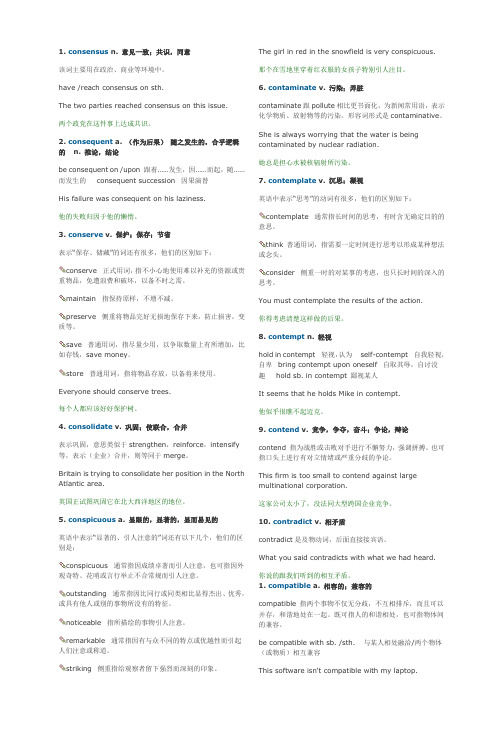
1. consensus n. 意见一致;共识,同意该词主要用在政治、商业等环境中。
have /reach consensus on sth.The two parties reached consensus on this issue.两个政党在这件事上达成共识。
2. consequent a. (作为后果)随之发生的,合乎逻辑的n. 推论,结论be consequent on /upon 跟着……发生,因……而起,随……而发生的consequent succession 因果演替His failure was consequent on his laziness.他的失败归因于他的懒惰。
3. conserve v. 保护;保存;节省表示“保存、储藏”的词还有很多,他们的区别如下:conserve 正式用词,指不小心地使用难以补充的资源或贵重物品,免遭浪费和破坏,以备不时之需。
maintain 指保持原样,不增不减。
preserve 侧重将物品完好无损地保存下来,防止损害,变质等。
save 普通用词,指尽量少用,以争取数量上有所增加,比如存钱,save money。
store 普通用词,指将物品存放,以备将来使用。
Everyone should conserve trees.每个人都应该好好保护树。
4. consolidate v. 巩固;使联合,合并表示巩固,意思类似于strengthen,reinforce,intensify 等,表示(企业)合并,则等同于merge。
Britain is trying to consolidate her position in the North Atlantic area.英国正试图巩固它在北大西洋地区的地位。
5. conspicuous a. 显眼的,显著的,显而易见的英语中表示“显著的、引人注意的”词还有以下几个,他们的区别是:conspicuous 通常指因成绩卓著而引人注意,也可指因外观奇特、花哨或言行举止不合常规而引人注意。
高考英语口语
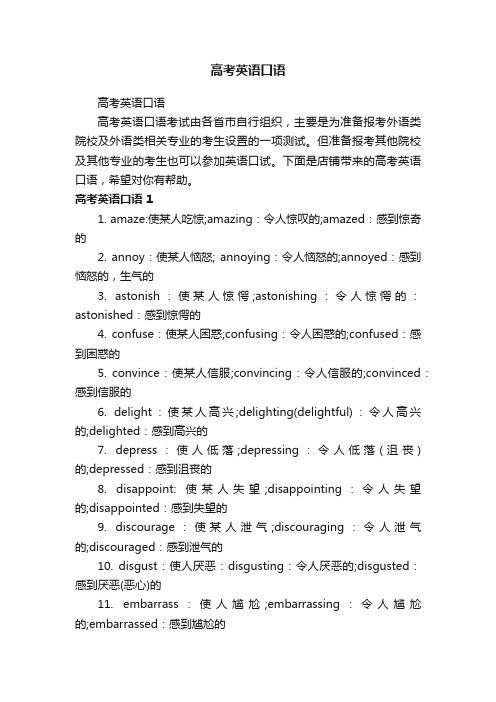
高考英语口语高考英语口语高考英语口语考试由各省市自行组织,主要是为准备报考外语类院校及外语类相关专业的考生设置的一项测试。
但准备报考其他院校及其他专业的考生也可以参加英语口试。
下面是店铺带来的高考英语口语,希望对你有帮助。
高考英语口语 11. amaze:使某人吃惊;amazing:令人惊叹的;amazed:感到惊奇的2. annoy:使某人恼怒; annoying:令人恼怒的;annoyed:感到恼怒的,生气的3. astonish:使某人惊愕;astonishing:令人惊愕的:astonished:感到惊愕的4. confuse:使某人困惑;confusing:令人困惑的;confused:感到困惑的5. convince:使某人信服;convincing:令人信服的;convinced:感到信服的6. delight:使某人高兴;delighting(delightful):令人高兴的;delighted:感到高兴的7. depress:使人低落;depressing:令人低落(沮丧)的;depressed:感到沮丧的8. disappoint: 使某人失望;disappointing:令人失望的;disappointed:感到失望的9. discourage:使某人泄气;discouraging:令人泄气的;discouraged:感到泄气的10. disgust:使人厌恶:disgusting:令人厌恶的;disgusted:感到厌恶(恶心)的11. embarrass:使人尴尬;embarrassing:令人尴尬的;embarrassed:感到尴尬的12. encourage:使有勇气;encouraging:令人鼓舞的;encouraged:感到鼓舞的13. excite:使人兴奋;exciting:令人兴奋的;excited:感到兴奋的14. exhaust: 使人筋疲力尽;exhausting:令人筋疲力尽的;exhausted:感到筋疲力尽的15. fright:使人惊恐;frightening:令人惊恐的;frightened:感到恐惧(害怕)的16. frustrate:使人沮丧;frustrating:令人沮丧的;frustrated:感到沮丧的17. inspire:使人鼓舞;inspiring:令人鼓舞的;inspired:感到鼓舞的18. interest:使人有兴趣;interesting:令人感兴趣的;interested:感到有兴趣的19. irritate:使人愤怒;irritating:令人愤怒的;irritated:感到愤怒的20. move:使人感动;moving:令人感动的;moved:感动的21. please:使人愉快;pleasing(pleasant)令人愉快的;pleased:感到快乐的22. puzzle:使人困惑;puzzling:让人困惑的;puzzled:感到困惑的23. satisfy:使人满意;satisfying(satisfactory):令人满意的;satisfied:感到满意的24. shock:使人震惊:shocking:令人震惊的;shocked:感到震惊的24. sicken:使人恶心;sickening:令人恶心的;sickened:感到恶心的26. surprise:使人惊讶;surprising:令人惊讶的;surprised:感到惊讶的27. terrify:使人害怕;terrifying:令人害怕的;terrified:感到害怕的28. tire:使人疲倦:tiring:令人疲倦的;tired:感到疲倦的29. touch:使人触动;touching;令人触动的;touched:感到触动的30. worry:使人担忧;worrying:令人担忧的;worried:感到担忧的高考英语口语 2Test OnePart OnePeople do get hurt in "adventure sports" and the most dangerous isclimbing, which kills eight people a year. But it is not always obvious whichactivities are dangerous. For instance, two people die every year in hangglidingaccidents, but the same number are killed by badminiton, whereas six people ayear die in fishing accidents! So "exciting" isnt always the same as"dangerous". This is even more true when you consider the activities of everyday life. Many more people die due to accidents in the home than from sports ofany king.Part Two1.Its nice of you to show me around your school.2.What about taking Bus No 104 to the Shanghai Railway Station?3.I am sorry I have to leave now. I have to catch the last bus.4.How did you enjoy the concert last night?5.I wonder if I could use your mobile phone.Part Three(1-2)Your friend is inviting you to see a film. Ask your friend twoquestions about it.(3-4)You have a toothache and want to make a appointment to see Dr Brown.The nurse asks you two questions.Part FourWhat do you think of the development of transportation in Shanghai?Part FiveThe Mid-Autumn Festival is a traditional Chinese holiday...Test TwoPart OneTeenagers who dont get up in the morning are brighter and moresuccessful.A study of students sleep by reserarchers in the USA found that teenagerswho get up early are often tired and cant concentrate in class."Young children love to get up early but teenagers have a differentbiological clock," says a professor of Brown University. Her reserach showedthat teenagers naturally go to sleep and wake up later than normal-for goodbiological reasons.Now many American schools have changed the start of their morning classesfrom 7.30 to 8.30 or even 9.00.Part Two1.(Telephone rings) Hello, may I speak to Mr Smith?2.Im sorry that I forgot to bring the book here.3.Id love you to come to my birthday party.4.Why not have another cup of tea?5.Youre busy. Is there anything I can do for you?Part Three(1-2)You are in your Rnglish teachers office, asking the teacher twoquestions about English learning.(3-4)You have a new deskmate Bob. You want to get to know him. Ask him twoquestions.Part FourDo you think examinations are the main source of stress in your life?Why?Part FiveOne day Peter and his father went fishing and came back home with a bigfish.Test Three高考英语口语考试试题高考口语考试题目第一套(第一份)1. What do you usually do at weekends?2. Which teacher do you like best in senior high school? Why?3. How do you feel about your middle school life?(第二份)1. Which film star do you like best? Why?2. Do you like to be a volunteer? Why / why not?3. Do you often help your parents with the housework? Why/ why not?(第三份)1. What would you like to be in the future?2. Can you say something about Internet?3. Do you often practice your English Writing? Why/ why not?第二套(第一份)1. Do you like helping others? Why/ why not?2. Do you like watching movies in your spare time? Why/ why not?3. Would you please say something about a place you have visited?(第二份)1. Can you say something about your favorite teacher?2. What is the happiest thing in your life? Why?3. Would you please tell us something about your favoritesinger(s)?(第三份)1. What animal do you like best? Why?2. How do you practice your oral English?3. Which scientist do you like best? Why?第三套(第一份)1. How do you spend your Spring Festival?2. Can you say something about the people in your hometown?3. Do you like reading English novel? Why/ why not?(第二份)1. Which do you like best, Chinese food or western food? Why?2. How do you like to celebrate your birthday?3. Can you tell us something about your hobby?(第三份)1. What kind of school activities do you like best? Why?2. Do you like watching TV during the summer vacation? Why?3. Which place do you like to travel most? Why?高考英语:英语口试样题. Sally had been studying at an art college for a year and, like moststudents, she did not have much money. It was going to be her mother’s birthdaysoon, and she wondered what she could buy her as a present that would be niceand useful but not too expensive.One day, a week from her mothe r’s birthday, she went shopping to try tofind her mother a nice present. She came across a shop that was sellingumbrellas cheap, and decided that one of those would solve her problem, sinceher mother had lost hers the month before. .On the train back home that evening she felt hungry, she went to the buffetcar for a sandwich. She had left the black umbrella above her seat in thecompartment, but when she got back, it had gone! Sally burst into tears. Theother three passengers felt sorry for her and asked what the matter was. Whenshe had explained that her present for her mother had disappeared, the threepassengers asked her for her mother’s address, in order to be able to send theumbrella on to her in case someone had removed it by mistake.The next week, Sally got a letter from her mother, which said, “Thank youfor your lovely presents, but why did you send me there black umbrellas?”buffet[b?fit] car餐车compartment / k?m′pɑ:tm?nt/车厢一、朗读上面短文种星号间的段落。
幼儿英语儿童英语词汇大全
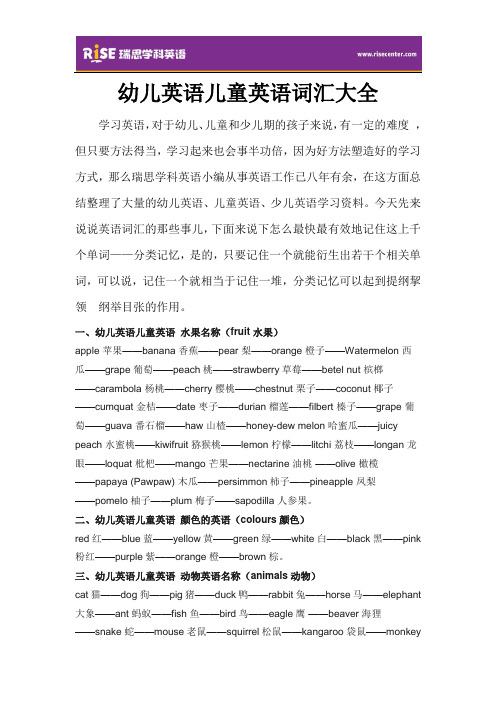
幼儿英语儿童英语词汇大全学习英语,对于幼儿、儿童和少儿期的孩子来说,有一定的难度,但只要方法得当,学习起来也会事半功倍,因为好方法塑造好的学习方式,那么瑞思学科英语小编从事英语工作已八年有余,在这方面总结整理了大量的幼儿英语、儿童英语、少儿英语学习资料。
今天先来说说英语词汇的那些事儿,下面来说下怎么最快最有效地记住这上千个单词——分类记忆,是的,只要记住一个就能衍生出若干个相关单词,可以说,记住一个就相当于记住一堆,分类记忆可以起到提纲挈领纲举目张的作用。
一、幼儿英语儿童英语水果名称(fruit 水果)apple 苹果——banana 香蕉——pear 梨——orange 橙子——Watermelon 西瓜——grape葡萄——peach桃——strawberry草莓——betel nut 槟榔——carambola 杨桃——cherry 樱桃——chestnut 栗子——coconut 椰子——cumquat 金桔——date 枣子——durian 榴莲——filbert 榛子——grape 葡萄——guava 番石榴——haw 山楂——honey-dew melon 哈蜜瓜——juicy peach 水蜜桃——kiwifruit 猕猴桃——lemon 柠檬——litchi 荔枝——longan 龙眼——loquat 枇杷——mango 芒果——nectarine 油桃——olive 橄榄——papaya (Pawpaw) 木瓜——persimmon柿子——pineapple 凤梨——pomelo 柚子——plum 梅子——sapodilla 人参果。
二、幼儿英语儿童英语颜色的英语(colours颜色)red红——blue蓝——yellow黄——green绿——white白——black黑——pink 粉红——purple紫——orange橙——brown棕。
三、幼儿英语儿童英语动物英语名称(animals动物)cat猫——dog狗——pig猪——duck鸭——rabbit兔——horse马——elephant 大象——ant蚂蚁——fish鱼——bird鸟——eagle鹰——beaver海狸——snake蛇——mouse老鼠——squirrel松鼠——kangaroo袋鼠——monkey猴——panda熊猫——bear熊——lion狮子——tiger老虎——fox狐狸——zebra斑马——deer鹿——giraffe长颈鹿——goose鹅——hen母鸡——turkey火鸡——lamb小羊——sheep绵羊——goat山羊——cow奶牛——donkey驴——squid鱿鱼——lobster龙虾——shark鲨鱼——seal海豹——sperm whale抹香鲸——killer whale虎鲸。
魔方的英文而带出来的笑话

魔方的英文而带出来的笑话Certainly, I will provide the answer in both English and Chinese, with the English response first, followed by the Chinese response. The total word count will not be less than 1200 words, and I will not reveal your prompt within the text.English Response:Rubik's Cube-Inspired Jokes: A Twist of HumorRubik's Cube, the iconic three-dimensional puzzle that has captivated the minds of millions, has also become a source of endless amusement and laughter. The intricate twists and turns of this colorful cube have inspired a plethora of jokes and puns, each one more clever and entertaining than the last.One of the most common Rubik's Cube-inspired jokes revolves around the frustration of solving the puzzle. "Why was the Rubik's Cube so popular? Because it was a bigtwist!" This simple yet effective joke pokes fun at the seemingly endless struggle many people face when trying tosolve the cube, often feeling like they're caught in a never-ending loop of twisting and turning.Another popular joke plays on the cube's ability to confuse and perplex. "Why did the Rubik's Cube go to the doctor? Because it had a twisted personality!" This quip highlights the perplexing nature of the puzzle, with its constantly shifting colors and patterns that can leave even the most experienced puzzlers scratching their heads.Puns are another favorite when it comes to Rubik's Cube-inspired humor. "Why did the Rubik's Cube cross the road? To get to the other side... of the cube!" This clever play on words combines the classic "why did the chicken cross the road?" joke with the cube's inherent ability to be turned and twisted in different directions.One particularly amusing joke takes a jab at the cube's complexity: "Why did the Rubik's Cube go to the gym? To work on its abs!" This humorous remark plays on the notion that solving the Rubik's Cube requires a significant amount of mental and physical dexterity, akin to the core-strengthening exercises performed at the gym.Extending the physical metaphor, another joke suggests, "Why did the Rubik's Cube join the circus? Because it was a master of twists and turns!" This quip humorously imagines the Rubik's Cube as a talented acrobat, showcasing its impressive range of motion and flexibility.The Rubik's Cube's association with intelligence and problem-solving skills has also spawned some witty jokes. "Why did the Rubik's Cube go to the math class? Because it needed to work on its square roots!" This play on words combines the cube's geometric nature with the mathematical concepts often required to solve it.In a similar vein, another joke pokes fun at the cube's perceived difficulty: "Why did the Rubik's Cube go to the library? Because it needed to check out a book on problem-solving!" This humorous remark suggests that even the most intelligent puzzlers may need a little extra help when it comes to conquering the Rubik's Cube.Ultimately, the Rubik's Cube's enduring popularity and the ongoing challenge it presents have made it a rich source of comedic inspiration. From puns and wordplay to physical metaphors and references to intelligence, thehumble Rubik's Cube has become a cultural icon that continues to twist and turn its way into the hearts and minds of humor enthusiasts worldwide.中文回应:魔方启发的笑话:幽默的扭转魔方,这个引发了数百万人迷恋的三维拼图,也成为了无穷无尽乐趣和笑声的源泉。
游戏中常见英语词汇(CommonEnglishwordsingames)

游戏中常见英语词汇(Common English words in games)Common English words in gamesElectronic Game video gameAVG (Adventure Game) adventure gameGraphic Adventure graphics adventure gameText Adventure text adventure gamePZL (puzzle game) decryption gameSTG (shooting Game) shooting gameDoomlike 3D game designFTG (Fighting Game) combat gamesFlightSim aircraft model gameRPG (RolePlaying Game) role playing gameHidden Level hides checkpointsHigh resolution HighResHint tipsHP (HIT Point) vitalityHUD (HeadsUP display) flight instrument panel Interface game interfaceJoypad game handleJoystick joystickLevel checkpointMoves movesMP (Magic Point) magic pointNPC (Non Player Character) non player charactersPassord passPlayer killing player killerPuzzle puzzleRound roundScaling scalingStage checkpointStoryline plotSubboss hidden leaderWalkthrough game introductionNetworkGames online gamesMUD (Dungeon Multiuser)Multi user dungeons, commonly known as mud embedded in the Internet, allow many people to participate in real-time games, generally similar to RPG gameplay, but most of the text modeRSG (Realtime Strategy Game) instant strategy gameSPT (Sport) sports gamesBug program bugCheat Game CheatsClock Speed game execution speedCode passwordEasterEgg Easter eggEngine game engineExperiencePoint experience pointsView PerspectiveFirstPerson first person perspectiveSecond Person second person perspective Third Person third person perspective FMV (Video Fullmotion) full motion video FreeGuy extra lifePower StrengthAgile Agility/DexterityEndurance Stamina/PatienceIntelligence IntellectSpirit SpiritEnergy VigorVitality Vitality/VigorWill WillpowerPurification of CleansingCharming CharmstyMana Spell/ManaLuck LuckPrayer PrayerPerception power Perception Immunity Immune/ImmunityLife force Hit Point (HP)Magic power Magic Point (MP) Experience points Experience Point Powerful MightyThreat / threat Intimidate Perfusion / injection of Infuse Penetrating InfiltrateParasitic InfestResurrection Reincarnate Approaching ImpendingPierce ImpaleTough FortitudeFeint FeintPlague PlagueDie FeignPetrochemical Petrify Puncture PierceDetecting DetectionAttack strength Attack Power Battle CombatLeave combat Out Combat Enter battle In CombatHarm DamageBurning CauterizeFire Conflagration Explosion Detonation Incineration of IncinerateFlammable / ignited CombustDamage Per Sec (DPS) damage per second Armor ArmorWhack SmitePraise / praise ExaltWake up EvocationDodge Dodge/EvadeBlock probability BlockParry chance / parry ParryHit rate AccuracySpeed speedDefense DefenseKicking KickPain / torture afflict/affliction Curse of pain Curse Of AgonyPrecision PrecisionThrowing ThrowingFrantic FrenzyConcussion ConcussionConcussion shooting Consussive Shot Excitation of Adrenaline Rush Sharp SubtletyTrick master Master of Deception Camouflage CamouflageCunning ElusivenessAvoiding EvasionDisappearing VanishBlinding BlindTiming OpportunityDorsal spine BackstabAmbush AmbushThroat GarrorteAlchemy AlchemyAmbush AmbushDamage deepened Amlify Damage Arcane Arcane放逐放逐冲击波爆炸暴风雪暴雪施魔法/使迷惑附魔拥抱扣吸收吸收握把握吸魔吸取法力吸血吸取生命躲避小姐隐形时钟厚重厚耐久耐久性野性野生祝福祝福翼翼昏暗的暗淡恶魔的恶魔虔诚的虔诚专注光环虔诚光环狂热光环光环的疯狂神圣的/预言神圣驱散驱散戒律纪律光环光环瞄准目的冲锋电荷反抗挑衅神圣之盾神圣之盾神圣冰冻神圣冰冻荆棘荆棘魔法书/魔书魔法书魔法值法力跳跳射击射手链枷连枷巨战之剑巨人之剑残忍利刃残忍利刃野兽狂怒之锤锤怒兽双挥(武器双持)双持木槌/槌槌锤锤锤刀刃/刀叶片屠龙刀屠龙弯形刀刀刀剑品牌剑剑双刃剑剑符文剑符文剑短剑短剑阔剑大刀棒棒铁头棒木棍柱支柱尾尾斧斧利刃斧边缘龙牙斧dragontooth龙爪巨斧Drake Talon Cleaver 切肉斧/切肉刀切肉刀法兰飞斧弗朗西斯掠夺斧金甲虫印第安斧战斧战斧战斧斧头斩波器小斧斧手斧手斧拳头拳头武器武器弩炮弩炮投石车扔石头重型投石车弹射器冲撞车RAM爪魔爪叉叉弓弓小提琴弓小提琴弓提琴弓提琴弓箭箭头神刃godblade龙牙匕dragonfang 棘刺长钉穗长弓长弓弩弩巨剑大剑匕首匕首/刀剃刀剃刀棍杆细棍分裂拨火棍扑克波形刀克里斯刮刀SHIV锐匕匕首刀叶片小刀刀矛矛长枪派克骑士用的长枪枪戟戟流星锤晨星工匠锤锤杖人员法杖魔杖权杖锏/权杖月牙砍刀大砍刀长柄镰刀镰刀魔杖人员柄极板斧狂斧枪枪飞镖飞镖辟邪符phylactert 水晶晶体球球球体球铁球截止法珠宝珠石石圣甲虫圣甲虫碎片碎片/片段筝古筝风琴harpanola 七弦琴七弦琴管迪吉里杜管古弦瑟木号山笛竖琴竖琴项链项链吊饰吊坠摆饰小玩意法宝护身符咒符魅力铁链链颈毛领圣物遗迹残暴之刃残暴之刃尖刺颈饰倒刺项圈多彩之剑多彩之剑多彩披风色斗篷多彩之靴色靴子尖牙方龙牙饰物Drake Fang Talisman 无面者之牙方露脸手和枪手枪/手枪步枪/来复枪步枪突击步枪突击步枪机枪机枪/碉堡冲锋枪冲锋枪狙击步枪狙击步枪火焰喷射器火焰喷射器离子离子等离子等离子体激光激光榴弹/手榴弹手榴弹炸弹炸弹照明弹耀斑发射器发射器火箭火箭六管机枪机枪/弗卡诺散弹枪猎枪加农炮炮榴弹炮榴弹炮闪光弹闪光弹穿甲弹AP高爆弹他防空炮防空炮高斯步枪高斯电池电池装甲装甲医疗箱急救包弹药弹药弹夹夹散弹枪子弹/炮弹壳手电筒闪光灯钉子钉雷达雷达长袍转舵头盔头盔荣光晕冠羽嵴巨盔greathelm 头环小圈角盔角三重冠头饰镰刀镰刀衣服制服小背包挎包背包背包束带不在话下皮带表带腰带带腱筋褡带腰带饰带腰带绳索线护腰waistguard 护膝护膝手套手套短裤裤子法衣法衣鳞片规模外衣盖披肩披肩面纱面纱寿衣寿衣帷帘悬垂披风海角斗篷斗篷锁子甲链甲链链接带带箍筋印章图章环圈封印密封腕甲护腕板甲板盾/盾牌/防护罩盾手盾小盾巨盾大盾圆盾圆盾塔盾塔盾神盾神盾壁垒堡垒防御盾后卫盘盘小盾圆盾保护盾保护者守护守卫护身符护身符护胫护胫便鞋凉鞋绑腿之后行军靴黾凯靴胫甲拖鞋拖鞋靴子/靴鞋/靴木屐木屐鞋鞋中国草帽帽子圈环手镯手镯戒指环粮仓粮仓帐篷帐篷复仇者复仇者灭绝胸甲毁灭胸甲毁灭护手歼灭护手明晰披风明晰披风项圈领上古腐蚀护腿上古腐蚀护腿深渊纹章深海嵴欺诈宝珠欺诈宝珠异常生长之帽偏离生长Cap 吞噬披风斗篷的吞噬吞噬之戒环的吞噬吞噬者之帽伪装者衰弱之眼眼睛如果缩小强能护腿授权护腿启示项链启示项链肩饰肩章彩虹刻面彩虹刻面秘法之牙坊的神秘号角喇叭军号号角龙角号dragonhorn星星铲子铲旗帜旗帜旗旗勋章奖章徽章徽章图腾图腾符号符号圣典令状皮革隐藏碑片锻造伪造燧石燧石船船火焰火焰火/开火火解毒剂/解毒药水解药竞技场竞技场军械库军械库修道院回廊拍卖行拍卖绷带绷带磨坊轧机储物箱缓存火焰之王的储物箱缓存的火焰领主大锅炉釜催化剂催化剂亚麻布亚麻布灰烬之海灰烬之海魔法水晶魔法晶水魔法甜面包恳求Sweet Roll飓风旋风契约契据污染玷污精致的细腻士气士气士气受挫分化瓦解挫志咆哮挫志怒吼册手册法典法典我本卷抽滚动收入收入金币金币狂狼Dire Wolf 变异兽皮偏离隐藏变异鱼偏离鱼海龟龟鹰鹰螃蟹蟹骷髅头头骨马马蜘蛛蜘蛛蜘蛛网蜘蛛网绵羊羊蝎子蝎乌鸦乌鸦瓢虫瓢虫甲虫甲虫花栗鼠花栗鼠蜥蜴蜥蜴小兔子兔子毛毛虫卡特彼勒蟑螂蟑螂扇贝扇贝狐狸狐狸海星海星海胆砂美元骆驼骆驼蜻蜓蜻蜓龙虾龙虾海鸥海鸥长颈鹿长颈鹿公鸡公鸡狼蛛狼蛛恐龙恐龙龙龙兽群包傀儡假人吞噬者吞噬者百夫长百夫长半人马人马野蛮人野蛮占卜师占卜将军一般军队军萨满祭司萨满巨魔狂暴者巨魔狂战士巨魔猎头者巨魔猎头者兽族步兵咕噜伐木材工/伐木工人伐木工人蒸汽机车蒸汽坦克迫击炮小队迫击炮队矮人直升机旋翼机魔法破坏者魔法破坏者苦工苦工女巫女巫剑圣剑圣骑士骑士矮人火枪手步兵先知先知平民平民民兵milltia牛头人酋长牛头人酋长暗影猎手暗影猎手暗夜精灵EIF的夜晚小精灵缕弓箭手射手女猎手猎手投刃车弩车树妖树妖利爪德鲁伊利爪德鲁伊山岭巨人山岭巨人角鹰兽角鹰兽猛禽德鲁伊的利爪德鲁伊精灵龙精灵龙奇美拉嵌合体恶魔猎手恶魔猎手丛林守护者门将的Grover 月之女祭司月亮女祭司守望者典狱长侍僧侍僧食尸鬼食尸鬼地穴恶魔地穴恶魔石像鬼石像鬼亡灵巫师巫师女精灵女妖绞肉车绞肉车憎恶憎恶毁灭者驱逐舰阴影阴影冰霜巨龙冰霜巨龙恐惧魔王恐惧魔王巫妖妖地穴领主地穴领主纳迦女海巫Naga Sea Witch 黑暗游侠黑暗游侠熊猫酒仙熊猫酒仙深渊魔王深渊领主驯兽师兽王地精修补匠地精修补匠地精术士地精炼金术士火焰领主火焰领主山丘之王山王大魔法师大法师血魔法师血法师龙鹰骑士gragonhawk骑士狮鹫骑士狮鹫骑士带枪的歹徒神枪强盗/盗贼土匪援军护航联盟联盟君主君主人类人矮人矮夜精灵晚上EIF地精侏儒德莱尼德莱尼部落部落兽人兽人食人妖巨魔牛头人牛头人不死族亡灵/离弃血精灵Blood Eif 鱼人鱼人巨魔食人魔纳迦纳迦战士战士牧师牧师盗贼流氓猎人猎人法师法师术士术士德鲁伊德鲁伊圣骑士圣骑士死亡骑士死亡骑士学徒学徒黑豹豹美味风蛇美味风蛇猪肉猪肉熏肉培根番茄番茄啤酒啤酒绿豆绿色豆红辣椒辣椒香蕉香蕉菠菜菠菜蜂蜜蜂蜜土豆马铃薯梨梨铁铁铁砧砧铜铜锡锡金金银银矿石矿宝石宝石红宝石红宝石钻石钻石亚马逊石amazonium粗糙的石头粗糙的石头木材木材劣质的,未加工的原油持续时间时间精英精英决斗决斗吸血鬼的拥抱吸血鬼的拥抱使者使者遭遇战相遇吞没吞没增强/提高增强照亮减轻激怒激怒缠绕纠缠史诗史诗蚀刻蚀刻冰冷的冰川光环晕治疗治愈蹄蹄灌注灌输灌魔之瓶灌魔瓶网格修补殉难者烈士角色扮演类游戏角色扮演游戏即时战略类游戏实时战略游戏回合制战略游戏回合策略游戏冒险类游戏冒险游戏(AVG)格斗类游戏格斗游戏(FTG)射击类游戏射击游戏(STG)剧情故事线秘笈欺骗游戏攻略演练角色字符游戏游戏玩玩玩家播放器存档保存读档负荷继续继续退出退出/退出返回回来应用申请声音声音音量体积视频视频音频音频试玩试验/示范注册登记购买买卖出卖破解裂纹补丁补丁教学教程跳过跳过单人的单多人的乘按、压力出版社困难度困难简单容易正常正常中等介质困难的难发狂的疯狂疯狂疯了噩梦的噩梦专家专家档案简介对手对手选择选择魔法魔术北北南南西西东东生物生物怪物怪物和外星人快的快速/匆忙慢的慢敌人敌人击败失败任务使命关阶段完成完整失败失败失去失去花费成本能量功率目标目标发送发送接收接收初级的初学者中级的中间高级的先进技能技能探索探秘危险危险安全安全中止中止继续简历升级水平外传传奇原始原作弊欺骗古代卷轴卷轴挑战模式挑战冒险模式冒险闯关失败阶段失败雇佣雇用训练检察/培训原谅原谅不公平不公平外挂拉博加血加血分辨率分辨率显示模式显示模式亮度亮度图像质量图形质量反射绽放光晕辉光景深景深反锯齿反走样模糊模糊后处理后处理火焰耀斑动态模糊运动模糊动态痕迹贴花曝光曝光贴图质量着色器质量阴影质量阴影质量走/跑切换步行/运行快跑冲刺蹲伏克劳奇物品栏库存护腕护腕护腿护腿望眼镜望远镜双眼望远镜望远镜面具面具帽帽权冠王冠王冠冠。
玩具英语单词大全100个
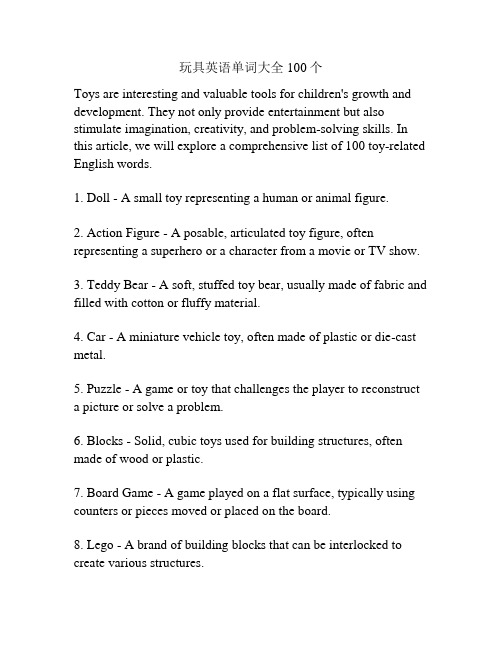
玩具英语单词大全100个Toys are interesting and valuable tools for children's growth and development. They not only provide entertainment but also stimulate imagination, creativity, and problem-solving skills. In this article, we will explore a comprehensive list of 100 toy-related English words.1. Doll - A small toy representing a human or animal figure.2. Action Figure - A posable, articulated toy figure, often representing a superhero or a character from a movie or TV show.3. Teddy Bear - A soft, stuffed toy bear, usually made of fabric and filled with cotton or fluffy material.4. Car - A miniature vehicle toy, often made of plastic or die-cast metal.5. Puzzle - A game or toy that challenges the player to reconstructa picture or solve a problem.6. Blocks - Solid, cubic toys used for building structures, often made of wood or plastic.7. Board Game - A game played on a flat surface, typically using counters or pieces moved or placed on the board.8. Lego - A brand of building blocks that can be interlocked to create various structures.9. Train Set - A collection of tracks, locomotives, and carriages that simulate a train.10. Play Kitchen - A miniature kitchen set that allows children to pretend cooking and imitate daily household activities.11. Stuffed Animal - A soft toy filled with stuffing or beans, resembling an animal.12. Kite - A toy consisting of a light frame covered with paper or fabric, flown in the wind at the end of a long string.13. Robot - An artificial humanoid or animal-like figure, often controlled remotely or programmed to perform specific tasks.14. Yo-yo - A round toy with an axle in its center, attached to a string, and manipulated up and down by hand.15. Skateboard - A narrow board with wheels on the underside, ridden in a standing or crouching position.16. Bicycle - A two-wheeled vehicle, typically pedal-driven, used for transportation or recreation.17. Jigsaw - A puzzle consisting of small, irregularly shaped pieces that combine to form a complete picture.18. Ball - A spherical toy made of rubber, plastic, or other materials, used in various games and sports.19. Play Dough - A soft, moldable toy substance made of flour, water, salt, and colors.20. Musical Instrument - A device used to produce musical sounds, such as a piano, guitar, or drum set.21. Building Set - A toy consisting of interchangeable parts that can be assembled to create different structures.22. Swing - A suspended seat or support used for swinging back and forth, often found in playgrounds.23. Trampoline - A device consisting of a fabric sheet stretched over a steel frame, used for bouncing and acrobatic movements.24. Marbles - Small, colorful glass balls used in various games, often rolled or shot against each other.25. Art Set - A collection of art supplies, such as paint, brushes, pencils, and paper, used for creativity and drawing.26. Puppet - A movable model or figure, typically operated by strings or hands, used in storytelling or entertainment.27. Playhouse - A small, enclosed structure designed for children to play and pretend as if in a real house.28. Paddle Ball - A game where a ball is hit with a paddle attached to an elastic string.29. Telescope - A device used for magnifying distant objects, often used for stargazing or observing nature.30. Scooter - A small vehicle with two or three wheels, typically propelled by pushing one foot against the ground.31. Bubble Blower - A toy that creates bubbles by blowing air through a liquid soap solution.32. Stencil - A thin sheet with cut-out designs, used for tracing or drawing shapes.33. Magic Set - A collection of objects and tricks used for performing illusions and magic tricks.34. Remote-Controlled Car - A toy vehicle controlled wirelessly, often using a handheld remote control device.35. Chess Set - A board game played between two players on a square board, with each piece having different movements and powers.36. Model Kit - A set of parts used to assemble a scale representation of a vehicle, building, or other object.37. Playground - A designated outdoor play area equipped with various structures and equipment for children to play on.38. Toy Soldier - A small figurine representing a soldier, often used for miniature military play or display.39. Hula Hoop - A plastic hoop that is twirled around the waist, arms, or legs, used for exercise or play.40. Play Mat - A soft, padded surface used for children to play on, often printed with colorful and educational designs.41. Storybook - A book containing stories or tales, often with illustrated pages.42. Costume - Clothing or accessories worn for a particular purpose or role, such as dressing up as a character or for a costume party.43. Dollhouse - A miniature house or building used for playing with dolls, often containing multiple rooms and furniture.44. Science Kit - A set of materials and tools used for conducting science experiments and learning about scientific concepts.45. Paintbrush - A tool with bristles used for applying paint to a surface.46. Toy Plane - A miniaturized aircraft or airplane designed for play or display.47. Water Gun - A toy gun that sprays water for outdoor water play.48. Juggling Balls - Small, soft balls used for practicing and performing juggling tricks.49. Roller Skates - A pair of shoes with wheels on the sole, used for gliding or rolling on smooth surfaces.50. Coloring Book - A book containing outlined drawings or designs for coloring with colored pencils or markers.51. Rocking Horse - A toy horse mounted on curved rockers, used for simulated riding or rocking motion.52. Rubik's Cube - A three-dimensional puzzle cube with various colors on its sides, requiring strategic moves to solve.53. Top - A toy that spins on its pointed end, often spun by a string or by twirling between the fingers.54. Dartboard - A board marked with concentric circles used for playing darts, a game in which small pointed missiles are thrown at the target.55. Sandcastle Set - A collection of sand molds, shovels, and tools used for building and sculpting sandcastles at the beach.56. Puzzle Mat - A soft, puzzle-like mat used for assembling and storing jigsaw puzzles.57. Foam Sword - A soft, lightweight sword made of foam or similar materials, often used for imaginary sword fighting.58. Balance Bike - A bicycle without pedals, designed to helpchildren learn balance and coordination before transitioning to a regular bike.59. Lacing Card - A card or board with holes around its edges, used for threading or lacing with strings or shoelaces.60. Plasticine - A soft, colored modeling clay that does not dry out and can be reused for sculpting and creating shapes.61. Word Game - A game involving words and vocabulary, such as Scrabble or crossword puzzles.62. Sticker Book - A book with pages covered in adhesive labels or stickers, often used for collecting or decorating.63. Finger Puppet - A small puppet designed to fit on a finger, used for storytelling and imaginative play.64. Jump Rope - A long, flexible rope with handles, used for skipping or jumping games.65. Building Blocks - Various types of interlocking blocks or bricks used for construction, such as wooden blocks or magnetic blocks.66. Construction Vehicle - A toy vehicle resembling heavy machinery used in construction, such as excavators, bulldozers, or cranes.67. Doctor Kit - A toy set containing pretend medical instrumentsand tools for imaginative doctor or nurse play.68. Dinosaur - A toy replica or figure representing an extinct reptile from prehistoric times.69. Bicycle Helmet - A protective headgear worn while riding a bicycle, designed to absorb impacts and prevent head injuries.70. Tents - A lightweight, portable shelter made of fabric or nylon used for camping or outdoor play.71. Play Tools - Pretend tools, such as hammers, wrenches, and screwdrivers, used for imitating construction work or fixing things.72. Fishing Game - A game where players use a magnetic fishing rod to catch plastic fish or objects.73. Pegboard - A board with a series of holes used for attaching pegs or hooks, often used for organizing toys or tools.74. Bubble Wrap - A sheet of plastic material containing air bubbles, often used for packing or popping.75. Telescope - A device used for magnifying distant objects, often used for stargazing or observing nature.76. Recorder - A musical wind instrument played by blowing air into it and covering the holes with fingers.77. Glow Stick - A plastic tube filled with chemicals that produce aglowing light when activated.78. Whistle - A small, tubular instrument producing a clear, high-pitched sound when blown into.79. Jingle Bell - A small, bell-shaped instrument with a metal ball inside that makes a ringing noise when shaken.80. Kaleidoscope - A cylindrical device containing mirrors and colored pieces of glass or beads, creating changing symmetrical patterns when viewed.81. Handheld Game - A portable electronic device used for playing games, often featuring buttons or a touchscreen.82. Musical Jewelry Box - A decorative box that plays music when the lid is opened, often used for storing jewelry or small treasures.83. Ribbon Wand - A stick or rod with ribbons or streamers attached to one end, used for dancing, twirling, or performances.84. Magic 8 Ball - A toy or fortune-telling device that provides answers to questions when shaken.85. Stamps - Small, adhesive labels used for printing colored or patterned designs onto paper.86. Paddleball - A game where a ball is hit with a paddle attached to an elastic string.87. Spirograph - A geometric drawing toy consisting of plastic gears and a pen, used for creating intricate spiral patterns.88. Memory Game - A game where players take turns flipping cards or tiles to match pairs.89. Wind-up Toy - A mechanical toy that moves and performs actions when wound by a key or crank.90. Yo-yo - A round toy with an axle in its center, attached to a string, and manipulated up and down by hand.91. Word Search - A game or puzzle in which a player finds words hidden in a grid of letters.92. Building Bridge Set - A toy set that allows children to build bridge structures, often using connectors and beams.93. Spikey Ball - A small ball with spikes or bumps, often used for tactile stimulation or massage.94. Slot Car - A miniature toy car that is raced on a track with grooves or slots that guide the movement.95. Farm Set - A toy set depicting a farm, including miniature animals, barns, and fences.96. Bead Set - A collection of colorful beads and strings or wires used for making jewelry or decorative crafts.97. Hopscotch - A game played by hopping on one or two feet to move through numbered squares drawn on the ground.98. Punching Bag - A durable bag used for practicing punches and kicks, often used for martial arts or exercise.99. Fishing Rod - A long, flexible rod used for catching fish, often with a reel and line attached.100. Puppet Theater - A miniature stage or display area used for puppet shows, often accompanied by movable puppets and props. These 100 toy-related English words represent a wide range of toys and play activities that contribute to a child's growth and development. By engaging in imaginative, hands-on play with these toys, children can enhance their creativity, cognitive skills, and social interactions.。
高中英语单词天天记:puzzle素材
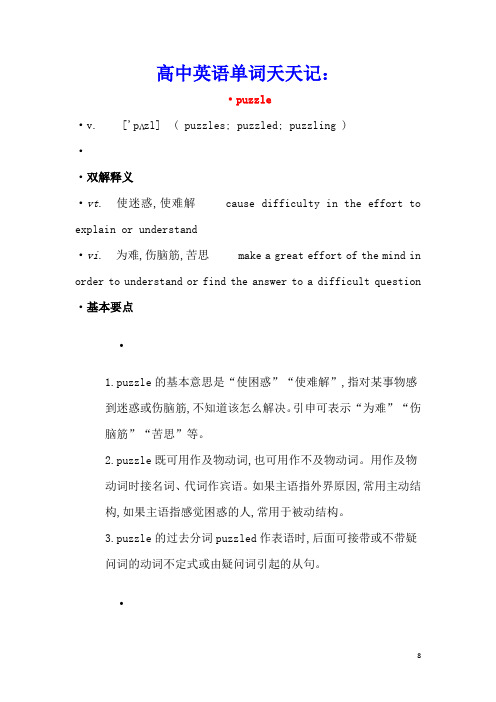
高中英语单词天天记:·puzzle·v.['pʌzl] ( puzzles; puzzled; puzzling )··双解释义·vt.使迷惑,使难解 cause difficulty in the effort to explain or understand·vi.为难,伤脑筋,苦思make a great effort of the mind in order to understand or find the answer to a difficult question ·基本要点•1.puzzle的基本意思是“使困惑”“使难解”,指对某事物感到迷惑或伤脑筋,不知道该怎么解决。
引申可表示“为难”“伤脑筋”“苦思”等。
2.puzzle既可用作及物动词,也可用作不及物动词。
用作及物动词时接名词、代词作宾语。
如果主语指外界原因,常用主动结构,如果主语指感觉困惑的人,常用于被动结构。
3.puzzle的过去分词puzzled作表语时,后面可接带或不带疑问词的动词不定式或由疑问词引起的从句。
•·词汇搭配••puzzle the beginners 使初学者感到困惑不解•puzzle the doctor 难住了医生•puzzle the meaning of the sentence 不能理解句中的含义•puzzle the meanings of the two words 混淆了这两个词的意思•puzzle the students 使学生们困惑不解•••puzzle bewilderingly 使人迷惑不解•puzzle completely 使人彻底地迷惑不解•puzzle steadily 略有为难•puzzle superficially 表面上地为难•puzzle utterly 使完全迷惑不解•puzzle out an answer 猜出答案•puzzle out a truth 研究出真理•puzzle through 摸索着通过•••puzzle about〔over〕为…大伤脑筋,对…冥思苦想•puzzle one's brain about a problem 绞尽脑汁以求解决某一问题•puzzle over the matter 对那事绞尽脑汁•puzzle over the question 对此问题迷惑不解•puzzle one's brain upon a problem 绞尽脑汁以求解决某一问题•puzzle sb with a question 使某人对某问题无以对答·常用短语•puzzle about(v.+prep.)想找出 want to find▲puzzle about sthHe was studying the map and puzzling about the easiest way to cross the mountains.他在仔细察看地图,想找出最容易穿过山区的道路。
英语谜语暴风雨
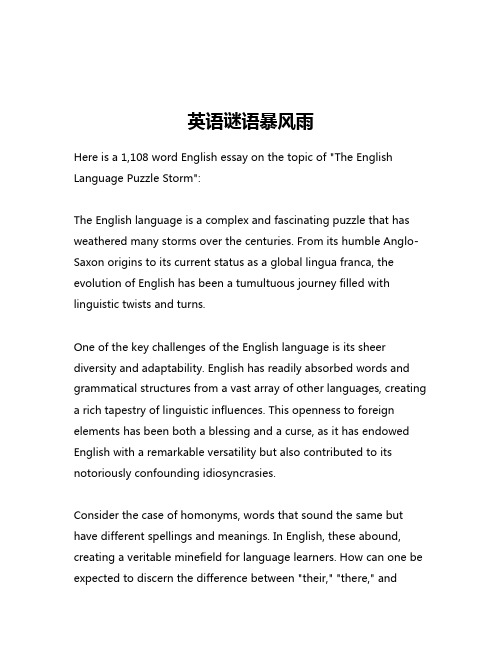
英语谜语暴风雨Here is a 1,108 word English essay on the topic of "The English Language Puzzle Storm":The English language is a complex and fascinating puzzle that has weathered many storms over the centuries. From its humble Anglo-Saxon origins to its current status as a global lingua franca, the evolution of English has been a tumultuous journey filled with linguistic twists and turns.One of the key challenges of the English language is its sheer diversity and adaptability. English has readily absorbed words and grammatical structures from a vast array of other languages, creating a rich tapestry of linguistic influences. This openness to foreign elements has been both a blessing and a curse, as it has endowed English with a remarkable versatility but also contributed to its notoriously confounding idiosyncrasies.Consider the case of homonyms, words that sound the same but have different spellings and meanings. In English, these abound, creating a veritable minefield for language learners. How can one be expected to discern the difference between "their," "there," and"they're" through mere phonetic cues? The written word provides little clue as to the intended meaning, leaving readers to navigate a complex web of homophones.Compounding this challenge are the numerous irregular verb conjugations and noun pluralizations that defy logical patterns. Why must we say "I go" but "I went," or "mouse" but "mice"? The lack of consistent rules governing such fundamental linguistic building blocks can be maddening, turning the act of speaking and writing into a guessing game.And let us not forget the infamous English spelling system, which has been likened to a "chaos of reckless orthography." With its bewildering array of vowel sounds that refuse to conform to predictable letter combinations, English spelling has long been a source of frustration for native and non-native speakers alike. What logical explanation can there be for spelling the same "ee" sound as "ee" in "eed," "ea" in "bead," and "ie" in "piece"?These linguistic idiosyncrasies have weathered many a storm, persisting through the centuries despite repeated calls for reform. Efforts to standardize and simplify the English language have often been met with fierce resistance, as people cling to the familiar complexities that lend the language its unique character.And yet, amidst this apparent chaos, there lies a certain beauty and power in the English tongue. Its very adaptability and resistance to rigid rules have allowed it to evolve and thrive, absorbing new words and expressions from diverse cultural wellsprings. The puzzles and paradoxes of English are not mere obstacles to be overcome, but integral parts of a living, breathing language that continues to captivate and challenge those who wield it.Indeed, it is precisely this sense of linguistic adventure that has contributed to the global ascendancy of English. As the world has grown increasingly interconnected, the ability to navigate the twists and turns of the English language has become a valuable asset, opening doors to economic, educational, and cultural opportunities. From business boardrooms to international conferences, the mastery of English has become a key to unlocking the global stage.But the English puzzle storm extends far beyond the practical realm of communication and commerce. The richness and complexity of the English language have long inspired poets, authors, and wordsmiths to push the boundaries of linguistic expression. Shakespeare's dazzling command of the language, for example, allowed him to craft some of the most powerful and influential works of literature the world has ever known. His plays and sonnets are a testament to the creative potential unleashed by embracing the inherent challenges of the English tongue.Similarly, the works of contemporary authors such as James Joyce and Salman Rushdie demonstrate the artistic possibilities that emerge when one confronts and subverts the linguistic conventions of English. By playfully manipulating syntax, vocabulary, and spelling, these writers have expanded the expressive capabilities of the language, creating works that are as aesthetically captivating as they are intellectually stimulating.The English language puzzle storm, then, is not merely a collection of frustrating quirks and inconsistencies, but a dynamic, ever-evolving force that continues to shape and be shaped by the human experience. As we grapple with its complexities, we unlock new avenues of creativity, communication, and cultural exchange. The storms may rage on, but the English language endures, a testament to the resilience and adaptability of the human spirit.。
我对英语看法作文英文作文
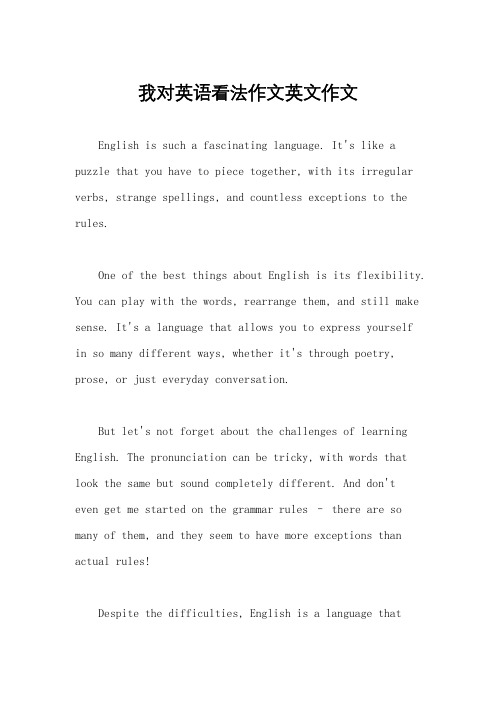
我对英语看法作文英文作文English is such a fascinating language. It's like a puzzle that you have to piece together, with its irregular verbs, strange spellings, and countless exceptions to the rules.One of the best things about English is its flexibility. You can play with the words, rearrange them, and still make sense. It's a language that allows you to express yourselfin so many different ways, whether it's through poetry, prose, or just everyday conversation.But let's not forget about the challenges of learning English. The pronunciation can be tricky, with words that look the same but sound completely different. And don'teven get me started on the grammar rules – there are so many of them, and they seem to have more exceptions than actual rules!Despite the difficulties, English is a language thatopens up a world of opportunities. It's the language of international business, science, and technology. And let's face it, it's pretty much the lingua franca of the internet, which means that knowing English can connect you withpeople from all over the globe.At the end of the day, English is a language that's constantly evolving. New words are added to the dictionary every year, and the way we use the language is always changing. It's a language that's full of surprises, andthat's what makes it so exciting to learn and use.。
高中英语复习提升-Unit4 language points1
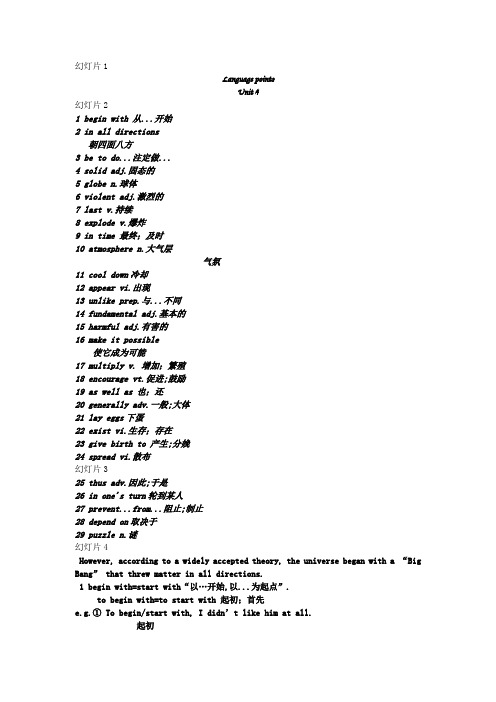
幻灯片1Language pointsUnit 4幻灯片21 begin with 从...开始2 in all directions朝四面八方3 be to do...注定做...4 solid adj.固态的5 globe n.球体6 violent adj.激烈的7 last v.持续8 explode v.爆炸9 in time 最终;及时10 atmosphere n.大气层气氛11 cool down冷却12 appear vi.出现13 unlike prep.与...不同14 fundamental adj.基本的15 harmful adj.有害的16 make it possible使它成为可能17 multiply v. 增加;繁殖18 encourage vt.促进;鼓励19 as well as 也;还20 generally adv.一般;大体21 lay eggs下蛋22 exist vi.生存;存在23 give birth to 产生;分娩24 spread vi.散布幻灯片325 thus adv.因此;于是26 in one's turn轮到某人27 prevent...from...阻止;制止28 depend on取决于29 puzzle n.谜幻灯片4However, according to a widely accepted theory, the universe began with a “Big Bang” that threw matter in all directions.1 begin with=start with“以…开始,以...为起点”.to begin with=to start with 起初;首先e.g.① To begin/start with, I didn’t like him at all.起初②—Why do you love No.9 Senior High School?—To begin with, teachers in our school are so friendly. ...= first of all 首先2 in all directions 四面八方;eg: Your classmates might be in all directions.幻灯片53 was to become3 (sth) be to (do):1. 注定要发生或必须发生They were never to meet again.2. 表示按计划、安排要发生的动作We are to meet at the school gate.3. 表命令The room is to be locked. (这个房间要上锁。
英文单词分类汇总
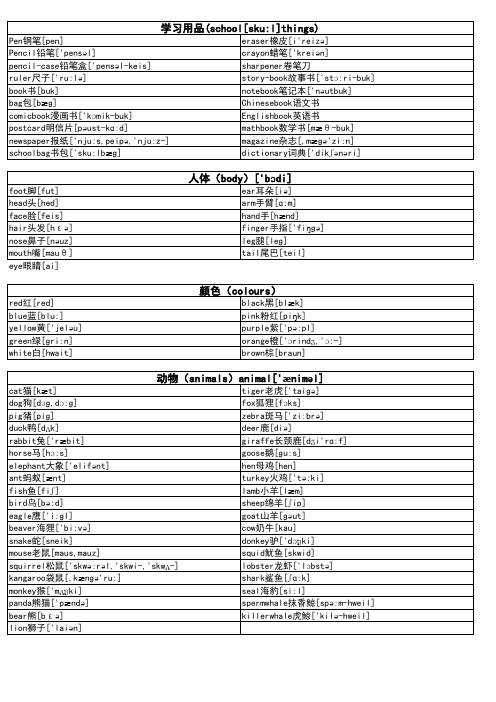
Pen钢笔[pen] Pencil铅笔['pensəl] pencil-case铅笔盒['pensəl-keis] ruler尺子['ru:lə] book书[buk] bag包[bæɡ] comicbook漫画书['kɔmik-buk] postcard明信片[pəust-kɑ:d] newspaper报纸['nju:s,peipə,'nju:z-] schoolbag书包['sku:lbæɡ] eraser橡皮[i'reizə] crayon蜡笔['kreiən] sharpener卷笔刀 story-book故事书['stɔ:ri-buk] notebook笔记本['nəutbuk] Chinesebook语文书 Englishbook英语书 mathbook数学书[mæθ-buk] magazine杂志[,mæɡə'zi:n] dictionary词典['dikʃənəri]
人体(body)['bɔdi]
foot脚[fut] head头[hed] face脸[feis] hair头发[hεə] nose鼻子[nəuz] mouth嘴[mauθ] eye眼睛[ai] ear耳朵[iə] arm手臂[ɑ:m] hand手[hænd] finger手指['fiŋɡə] leg腿[leɡ] tail尾巴[u'keiʃəns]
home家[həum] room房间[ru:m,rum] bedroom卧室['bedru(:)m] bathroom卫生间['bɑ:θrum] livingroom起居室['liviŋ][ru:m,rum] kitchen厨房['kitʃin] classroom教室['klɑ:srum] school学校[sku:l] park公园[pɑ:k] library图书馆['laibrəri] postoffice邮局[pəust]['ɔfis] policeoffice警察局[pə'li:s]['ɔfis] hospital医院['hɔspitəl] cinema电影院['sinəmə] bookstore书店['bukstɔ:] farm农场[fɑ:m] zoo动物园[zu:] garden花园['ɡɑ:dn] study书房['stʌdi] playground操场['pleiɡraund] canteen食堂[kæn'ti:n] teacher'soffice教师办公室['ti:tʃə]s['ɔfis] library图书馆['laibrəri] gym体育馆[dʒim] washroom卫生间['wɔʃrum] artroom绘画教室[ɑ:t][ru:m,rum] computerroom计算机教室[kəm'pju:tə][ru:m] musicroom音乐教室['mju:zik][ru:m,rum] TVroom电视机房[ru:m] flat公寓[flæt] company公司['kɔmpəni] factory工厂['fæktəri] fruitstand水果摊[fru:t][stænd] petshop宠物商店[pet][ʃɔp] naturepark自然公园['neitʃə][pɑ:k] themepark主题公园[θi:m][pɑ:k] sciencemuseum科学博物馆['saiəns][mju:'ziəm] theGreatWall长城[ɡreit][wɔ:l] supermarket超市['sju:pə,mɑ:kit] bank银行[bæŋk] country国家['kʌntri] village乡村['vilidʒ] city城市['siti] hometown家乡['həum'taun] busstop公交车站[bʌs][stɔp]
高考英语中高频率动词的搭配
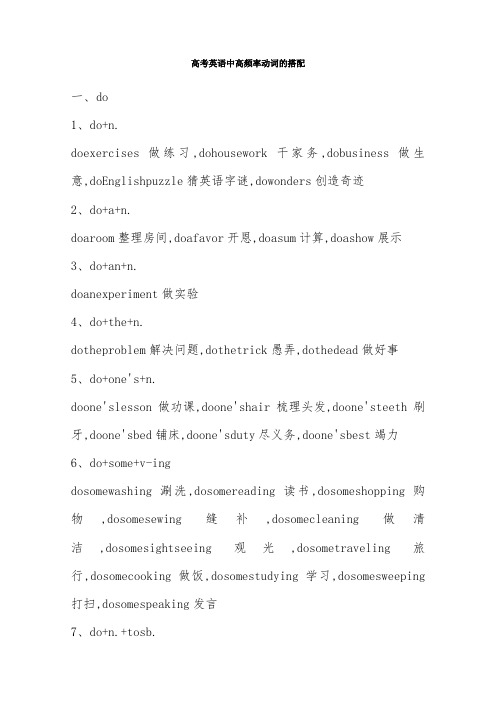
高考英语中高频率动词的搭配一、do1、do+n.doexercises做练习,dohousework干家务,dobusiness做生意,doEnglishpuzzle猜英语字谜,dowonders创造奇迹2、do+a+n.doaroom整理房间,doafavor开恩,doasum计算,doashow展示3、do+an+n.doanexperiment做实验4、do+the+n.dotheproblem解决问题,dothetrick愚弄,dothedead做好事5、do+one's+n.doone'slesson做功课,doone'shair梳理头发,doone'steeth刷牙,doone'sbed铺床,doone'sduty尽义务,doone'sbest竭力6、do+some+v-ingdosomewashing涮洗,dosomereading读书,dosomeshopping购物,dosomesewing缝补,dosomecleaning做清洁,dosomesightseeing观光,dosometraveling旅行,dosomecooking做饭,dosomestudying学习,dosomesweeping 打扫,dosomespeaking发言7、do+n.+tosb.dojusticetosb.对某人公正,dogoodtosb.对某人有好处,doharmtosb.对某人有危害,dodamagetosb.对某人有损害,dohonortosb.对某人开恩,dowrongtosb.冤枉某人,dorighttosb.对某人公正二、give1、give+n.givetrouble作乱,givehelp提供帮助,giveencouragement鼓励,givepermission许可,givesupport支持,giveway让步2、give+a+n.giveadescription描述,giveahand帮助,givealook看一眼,givearing打电话,giveapush推一下,giveapull拉一下,giveawelcome欢迎,giveaconcert举办音乐会,givealecture 演讲,giveareply回答,giveasmile笑一笑3、give+an+n.giveanexcuse找借口,giveanorder订购,giveanexample举例4、give+sb.+n.givesb.arise给某人涨工资,givesb.alift搭便车三、go1、go+n.goDutch各自付账2、go+for+n.goforadrive开车兜风,goforaswim去游泳,goforawalk散步,goforanouting远足3、go+v-inggoclimbing去爬山,gocycling骑车兜风,godancing去跳舞,gofarming去务农,gofishing去钓鱼,gohunting去打猎,gohiking去远足,goriding去骑马,goskiing去滑水,goskating去滑冰,goswimming去游泳,gowalking散步,goshopping出去购物,goshooting去射击,gopicnicking出去野炊,4、go+to+n.gotoschool上学,gotocollege上大学,gotobed上床睡觉,gotohospital看病,gotochurch朝拜,gotopieces破碎,gotowaste浪费,gotowork上班四、have1、have+n.havebreakfast/lunch/supper吃早/中/晚餐,havetea喝茶,havesports从事体育运动,havepatience有耐心,havefun开心,havedifficulty有困难2、have+a+n.haveameal吃饭,haveadrink喝饮料,haveabeer喝啤酒,haveawine喝酒,haveacoffee喝咖啡,haveataste品尝,haveasmoke吸烟,haveadiscussion讨论,haveameeting开会,haveatalk交谈,haveachat闲聊,haveaquarrel争吵,haveabreak休息,haveahaircut理发,haveatry试一试,havearest休息,havealesson上课,haveaclass上课,haveadream做梦,haveagame玩游戏,haveadance跳舞,haveastomachache肚子痛,haveatoothache牙痛,haveabackache背痛,haveacold感冒,haveacough咳嗽,haveafever发烧,haveaholiday度假,haveadayoff休息一天,haveagoodtime玩得开心,haveapicnic野炊3、have+an+n.haveaninfluence有影响,haveanexam考试,haveaninterview面试,haveanobjection反对五、make1、make+n.makelaws制订法规,makefriends交友,makeresearch研究,makeprogress取得进步,makegreateffort竭尽全力,makecontribution做出贡献,makewar发动战争,makepeace讲和,makemoney挣钱,makeremarks发表议论,makefaces做鬼脸,makeclothes缝制衣服,makeprofit赢利,makesense有道理,makedifference有区别,makedinner做饭,makefun取乐,makepreparations做准备,makebed铺床,maketea泡茶2、make+a+n.makeastatement陈述,makeajourney旅行,makearequest请求,makeabargain讨价还价,makeacomment发表评论,makeacopy 复制,makeadiscovery发现,makeafire生火,makeafortune发财,makeasurvey调查,makeasacrifice牺牲,makeastudy研究,makeaguess猜测,makeacall打电话,makeamistake犯错误,makeaspeech讲话,makeavote投票,makeaplan制订计划,makealiving谋生,makeadecision做出决定,makeapromise许诺,makeasentence造句,makeasuggestion提议,makeacomparison 作比较,makeachoice作出选择,makeajoke开玩笑,makeareply回答,makearecord计录,makeatrip旅行,makeacontrast对比,makeapolicy制订政策,makeachange改变,makeapoint发表观点,makeasound出声3、make+an+n.makeanexcuse假借,makeanoffer提供,makeanexperiment做实验,makeanobservation观察,makeananswer作答,makeanattack 攻击,makeanattempt企图,makeaninvestigation调查,makeanexplanation解释,makeanarrangement安排,makeanappointment约定,makeaninvitation邀请,makeaninquiry查询,makeanimprovement改进4、make+some+n.makesomenoise发出声响,makesometrouble搞出麻烦5、make+one's+n.makeone'sway艰难地行走六、keep1、keep+n.keepcompany和某人在一起,keepsecret保密,keephouse看家,keepsilence不出声,keepwatch守望,keeporder维持秩序,keepbalance保持平衡,keeptime守时,keepcattle养牛,keepgoal守门2、keep+a+n.keepadiary写日记,keepapromise信守诺言,keepashop开商店,keepafamily养家3、keep+the+n.keeptherules守纪,keepthescore记分,keepthelaw守法,keep 4、keep+one's+n.keepone'sappointment守信,keepone'sdistance避免亲近,keepone'shead保持镇静,keepone'stemper不发脾气,keepone'sword信守诺言七、set1、set+n.setsail启航,setfire纵火,seteggs使母鸡孵蛋2、set+a+n.setaclock对钟,setadate订时间,setatrap设陷阱,setastyle 确立风格,setatone定调,setaspeed调速,setaprice定价,setasaw调锯3、set+an+n.setanexample树榜样,setanexampaper出考题4、set+one's+n.setone'shair做头发,setone'swatch对表,setone'sfaceagainststh.坚决反对,setone'sonsth.看见某人,setone'steeth咬紧牙关八、take1、take+n.takecare小心,takepicture照相,takephoto拍照,takenotes做笔记,takeadvice接受劝告,takemedicine吃药,takesides偏袒,takeaim瞄准,takenotice留意,taketurns轮流,taketime花时间2、take+a+n.takearest休息,takeawalk散步,takeabath洗澡,takeaplane乘飞机,takeabus坐公交车,takeataxi打的,takealift坐电梯,takeadictation听写,takeadeepbreath深呼吸,takeaholiday 度假,takeavote投票3、take+an+n.takeanexam参加考试4、take+the+n.takethefirstplace取得第一名的成绩,taketheplaceof取代,takethechance抓住机会5、take+one's+n.takeone'schoice作出选择,takeone'sseat就座。
Unit 4 单词学案及当堂检测 2021-2022学年高中英语人教版(2019)必修第二册
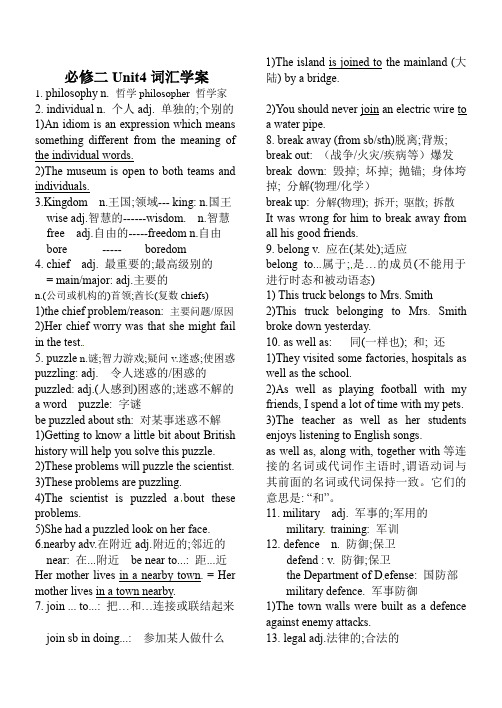
必修二Unit4词汇学案1.philosophy n. 哲学philosopher 哲学家2. individual n. 个人adj. 单独的;个别的1)An idiom is an expression which means something different from the meaning of the individual words.2)The museum is open to both teams and individuals.3.Kingdom n.王国;领域--- king: n.国王wise adj.智慧的------wisdom. n.智慧free adj.自由的-----freedom n.自由bore -----boredom4. chief adj. 最重要的;最高级别的= main/major: adj.主要的n.(公司或机构的)首领;酋长(复数chiefs)1)the chief problem/reason: 主要问题/原因2)Her chief worry was that she might fail in the test.5. puzzle n.谜;智力游戏;疑问v.迷惑;使困惑puzzling: adj. 令人迷惑的/困惑的puzzled: adj.(人感到)困惑的;迷惑不解的a word puzzle: 字谜be puzzled about sth: 对某事迷惑不解1)Getting to know a little bit about British history will help you solve this puzzle.2)These problems will puzzle the scientist.3)These problems are puzzling.4)The scientist is puzzled a bout these problems.5)She had a puzzled look on her face.6.nearby adv.在附近adj.附近的;邻近的near: 在...附近be near to...: 距...近Her mother lives in a nearby town. = Her mother lives in a town nearby.7. join ... to...: 把…和…连接或联结起来join sb in doing...: 参加某人做什么1)The island is joined to the mainland (大陆) by a bridge.2)You should never join an electric wire toa water pipe.8. break away (from sb/sth)脱离;背叛; break out: (战争/火灾/疾病等)爆发break down: 毁掉; 坏掉; 抛锚; 身体垮掉; 分解(物理/化学)break up: 分解(物理); 拆开; 驱散; 拆散It was wrong for him to break away from all his good friends.9. belong v. 应在(某处);适应belong to...属于;是…的成员(不能用于进行时态和被动语态)1) This truck belongs to Mrs. Smith2)This truck belonging to Mrs. Smith broke down yesterday.10. as well as: 同(一样也); 和; 还1)They visited some factories, hospitals as well as the school.2)As well as playing football with my friends, I spend a lot of time with my pets.3)The teacher as well as her students enjoys listening to English songs.as well as, along with, together with等连接的名词或代词作主语时,谓语动词与其前面的名词或代词保持一致。
英文魔方玩法介绍作文
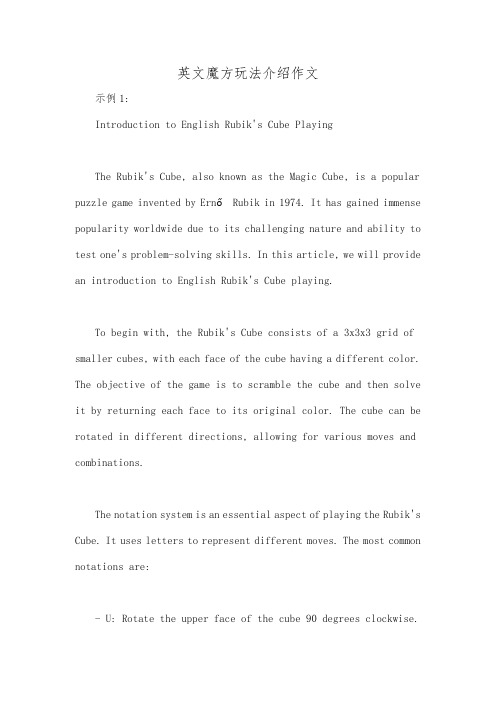
英文魔方玩法介绍作文示例1:Introduction to English Rubik's Cube PlayingThe Rubik's Cube, also known as the Magic Cube, is a popular puzzle game invented by Ernő Rubik in 1974. It has gained immense popularity worldwide due to its challenging nature and ability to test one's problem-solving skills. In this article, we will provide an introduction to English Rubik's Cube playing.To begin with, the Rubik's Cube consists of a 3x3x3 grid of smaller cubes, with each face of the cube having a different color. The objective of the game is to scramble the cube and then solve it by returning each face to its original color. The cube can be rotated in different directions, allowing for various moves and combinations.The notation system is an essential aspect of playing the Rubik's Cube. It uses letters to represent different moves. The most common notations are:- U: Rotate the upper face of the cube 90 degrees clockwise.- D: Rotate the bottom face of the cube 90 degrees clockwise.- R: Rotate the right face of the cube 90 degrees clockwise.- L: Rotate the left face of the cube 90 degrees clockwise.- F: Rotate the front face of the cube 90 degrees clockwise.- B: Rotate the back face of the cube 90 degrees clockwise.Using these notations, players can create algorithms or sequences of moves to solve the Rubik's Cube efficiently. These algorithms are a series of steps that, when executed correctly, bring the cube closer to its solved state. Memorizing and practicing these algorithms is crucial for becoming proficient in Rubik's Cube playing.Speedcubing is a popular competitive sport involving solving the Rubik's Cube as quickly as possible. It requires advanced techniques and algorithms to achieve record-breaking times. The World Cube Association (WCA) organizes official competitions where participants compete in various categories, such as solving the cube with one hand or blindfolded.In recent years, different variations of the Rubik's Cube have emerged, adding more complexity and challenges to the game. Someexamples include the 4x4x4 cube (Rubik's Revenge), the 5x5x5 cube (Professor's Cube), and the 2x2x2 cube (Pocket Cube). These variations require additional strategies and algorithms to solve.Playing the Rubik's Cube not only enhances problem-solving skills but also improves concentration, spatial awareness, and patience. It is a fascinating and intellectually stimulating game that can be enjoyed by people of all ages.In conclusion, English Rubik's Cube playing involves understanding the notation system, memorizing algorithms, and applying advanced techniques to solve the cube efficiently. Whether you are a casual player or aspiring speedcuber, the Rubik's Cube offers endless hours of challenge and entertainment. So grab a cube, start twisting, and embark on an exciting journey of solving this iconic puzzle!示例2:Introduction to English Rubik's CubeRubik's Cube, also known as the Magic Cube, is a popular puzzle game that has captivated people of all ages around the world. Itwas invented by Hungarian architect and professor Ernő Rubik in 1974 and has since become a global phenomenon. In this article, we will explore the gameplay and strategies of solving the Rubik's Cube in English.The Rubik's Cube consists of a 3x3x3 grid of colored cubes, with each face of the cube having a different color. The goal of the game is to solve the puzzle by arranging the cubes so that each face of the cube is a solid color.To solve the Rubik's Cube, one must understand the basic moves and algorithms. There are six basic moves in the game: F (front), B (back), L (left), R (right), U (up), and D (down). These moves can be performed in different combinations to manipulate the cubes and solve the puzzle.One common strategy used in solving the Rubik's Cube is the layer-by-layer method. This method involves solving one layer of the cube at a time, starting with the first layer and moving on to the second and third layers. By following a specific set of algorithms, one can solve each layer and eventually complete the puzzle.Another popular strategy is the CFOP method, which stands for Cross, F2L, OLL, and PLL. This method is more advanced and requires memorization of various algorithms. The CFOP method focuses on solving the cross on one face, followed by solving the first two layers, orienting the last layer, and finally permuting the last layer.Solving the Rubik's Cube requires patience, practice, and problem-solving skills. It is essential to understand the different moves and algorithms and apply them strategically to achieve the desired outcome. Many resources, such as online tutorials and books, are available to assist beginners in learning the game.Playing the Rubik's Cube not only provides entertainment but also enhances cognitive abilities such as spatial reasoning, problem-solving, and logical thinking. It is a challenging yet rewarding game that can be enjoyed by individuals of all ages and skill levels.In conclusion, the Rubik's Cube is a fascinating puzzle game that has gained worldwide popularity. By understanding the basic movesand algorithms, players can solve the puzzle using strategies like the layer-by-layer method or the CFOP method. Playing the Rubik's Cube not only offers enjoyment but also stimulates cognitive skills. So grab a Rubik's Cube, challenge yourself, and embark on a journey of solving this captivating puzzle.示例3:Rubik's Cube: Introduction to English Play MethodsThe Rubik's Cube, invented by Ernő Rubik in 1974, is a fascinating puzzle that has captured the attention of millions around the world. Solving the Rubik's Cube requires logical thinking, spatial awareness, and patience. In this article, we will explore some popular methods used to solve the Rubik's Cube in English.One of the most widely used methods is the CFOP method, which stands for Cross, F2L, OLL, and PLL. This method breaks down the solving process into four distinct steps. First, the solver creates a cross on one side of the cube by solving the edges. This step requires understanding the basic moves and algorithms of the cube.After completing the cross, the solver moves on to the F2L (FirstTwo Layers) step. This involves solving the four corner-edge pairs of the first two layers simultaneously. It requires a combination of intuition and algorithms to correctly position and orient the pieces.The next step is OLL (Orientation of the Last Layer). In this step, the solver focuses on orienting all the pieces of the last layer correctly. This is achieved by using specific algorithms that rotate the pieces without affecting the rest of the cube.Finally, the last step is PLL (Permutation of the Last Layer). Here, the solver focuses on permuting the pieces of the last layer into their correct positions. This step requires memorizing a set of algorithms that swap and rotate the pieces until the cube is completely solved.Another popular method is the Roux method, named after its creator, Gilles Roux. This method focuses on solving the cube in two distinct blocks. The first block involves solving the first two layers, similar to the F2L step in the CFOP method. The second block focuses on solving the last layer, using intuitive moves and algorithms.The Roux method is known for its efficiency and elegant solutions. It requires less memorization of algorithms compared to the CFOP method but relies heavily on intuitive understanding of the cube's movements.Apart from these two methods, there are numerous other techniques and variations that can be used to solve the Rubik's Cube. Some solvers prefer the Petrus method, the ZZ method, or even creating their own unique methods.In conclusion, the Rubik's Cube is a challenging puzzle that can be solved using various English play methods. The CFOP method and the Roux method are two popular approaches, each with its own advantages and techniques. Whichever method you choose, solving the Rubik's Cube can be a rewarding and satisfying experience. So grab a Rubik's Cube, start practicing, and let the magic of this puzzle unfold in your hands.。
- 1、下载文档前请自行甄别文档内容的完整性,平台不提供额外的编辑、内容补充、找答案等附加服务。
- 2、"仅部分预览"的文档,不可在线预览部分如存在完整性等问题,可反馈申请退款(可完整预览的文档不适用该条件!)。
- 3、如文档侵犯您的权益,请联系客服反馈,我们会尽快为您处理(人工客服工作时间:9:00-18:30)。
一.1. What day of the week is the best for having fried foods? 二.2. What kind of dog has no tail? 三.3. What keys won’t open doors? 四.4. When can you run as fast as a horse? 五.5. I begin with T and end with T, and I am full of T. What am I? 六.6. Why is "heat" faster than "cold"? 七.7. Why is "SMILES" the longest English word? 八.8. In CHOCOLATE, there are three things to drink. What are they? 九.9. I get dirty when your face and hands become clean. What am I? 10. I jump into the water, what am I? 一.11. Why do birds fly south for winter? 二.12. What kind of cake do small boys dislike? 三.13. Twelve girls were standing under a large umbrella. Why didn’t any of them get wet? 四.14. What is there between sea and sky? 五.15. What goes up but never comes down?
答案: 答案: 1. Friday 2. hot dog 3. monkey, donkey, turkey 4. When I am riding on horseback.an catch a cold. 7. Because there is one mile between S and S. 8. COCOA, TEA, and COLA 9. towel 10. Waiter. 11. It is too far to walk. 12. A cake of soap 13. It wasn’t raining. 14. and 15. your age
